

Which program are you applying to?
Grad school personal statement examples.
Get accepted to your top choice graduate school with your compelling personal statement.
You are a thoughtful, intelligent, and unique individual. You already know that – now you just need to convince top grad school adcoms that you’re a cut above the rest.
By reading the sample graduate school essays provided above, you should get a clear idea of how to translate your qualifications, passions, and individual experiences into words. You will see that the samples here employ a creative voice, use detailed examples, and draw the reader in with a clear writing style. Most importantly, these personal statements are compelling – each one does a fine job of convincing you that the author of the essay is a human being worth getting to know, or better yet, worth having in your next top grad school class. Grad school statement of purpose sample essays should be engaging and attention grabbing.
Here are the 5 things to include in a grad school personal statement:
- Engaging opening
- Consistent use of opening imagery
- A clear theme that ties the essay together
- Solid structure
- Good use of transitions
Grad school essay example #1: The environmental studies student
Two scenes stand out in my mind from my visit to Brazil’s Wetland: Forests burning before seed planting and trees as hedgerows. Before the planting season, I could see the leafless remnants of burnt trees still standing. READ MORE>>>
- Attention-grabbing opening: The author immediately grabs your attention by placing them in the midst of the scene and vividly conveying what the author saw.
- Vivid, visual opening: You can almost smell the burnt trees and see the ranches and farms thriving behind their protective forests.
- A clear theme that ties the essay together: The writer clearly states an interest in the clash between economic and environmental concerns throughout the essay. Discussion of coursework taken and how it influenced the author’s decision to pursue both master’s and PhD in Environmental Studies also flows through the essay.
- Solid structure: Thanks to the continued theme of the clash between economic and environmental concerns, this is a very easy essay to read. Mentions of different courses that piqued the writer’s interest also help to hold this essay together.
- Good use of transitions: Transitions help your reader move from one topic to the next as you connect the topic in the preceding paragraph to the topic in the next. They can consist of a few words or a phrase or simply the repetition of the topic by name as opposed to using a pronoun. The writer used the terminology connecting economics and the environment at the end of the first paragraph, and uses the same words at the beginning of the second one.
Grad school essay example #2: The engineering student
A simple bridge truss was the first structure I ever analyzed. The simple combination of beams that could hold cars, trains, and trucks over long spans of water fascinated me. Having the tools to analyze the loads on the truss further increased my interest in structures. READ MORE>>>
- Attention-grabbing opening: This writer immediately shared his fascination with bridge truss designs and makes the reader want to learn more about structural engineering.
- Consistent use of opening imagery: The writer begins his essay with the image of the first structure he ever analyzed – a simple bridge truss. This bridge truss becomes the basis for all of his future study of structural engineering and design. Toward the end of the essay, he states that design structure has fascinated him since he saw that first image of a bridge truss for his first engineering class.
- A clear theme that ties the essay together: The theme of structural design runs throughout the essay. It is mentioned right at the beginning of the essay, in following paragraphs and in the final paragraph as well. Toward the end of the essay, the writer discusses how a grad degree in engineering will help him reach both his short- and long-term goals.
- Solid structure: Since the theme of structural design and engineering are so strong throughout the essay, it is easy to follow along as the writer talks about different classes he has taken, an internship he did, and even an experience as a student volunteer.
- Good use of transitions: The author ends his first paragraph talking about the textbook for his first engineering class, and continues on this theme in the next paragraph. He then transitioned from classes he took to student volunteer research he participated in. When discussing what he plans to study in grad school, the same terminology is used again, joining the whole essay into one cohesive whole.
Grad school essay example #3: The public health student
What if people lived healthier lives, practiced preventive medicine, and took precautions against illness and disease? My days in the physical therapy department often made me think about the prevention of injuries as well as the injuries themselves. I was already doubting my future career choice as a physical therapist. READ MORE>>>
- Attention-grabbing opening: The author of this essay makes an early case for why he wants to leave the field of physical therapy and move to the public health arena. You can almost feel the writer’s frustration with physical therapy and their need to find a way to reach a broader population, provide primary care to them, while challenging and motivating the writer to improve.
- Consistent use of opening imagery: The idea of providing primary care to large populations and the benefits the population could get from this care are woven through the whole essay. Finding ways to improve the health of underprivileged populations is also found throughout the essay.
- A clear theme that ties the essay together: Provision of primary care to large communities is a theme that runs throughout the essay. The author’s work at a county health clinic cemented this idea and led to him choosing to pursue an education and career in public health.
- Solid structure: The theme of providing primary care to large underprivileged populations is a theme that ties this personal statement together.
- Good use of transitions: The words “public health” occur in every paragraph. The author ends the second paragraph talking about work in the field, and begins the next paragraph by mentioning field experience. This makes it easy to follow the flow of the essay.
Grad school essay example #4: The physician assistant student
I was nine years old and in the middle of Mrs. Russell’s third grade class when my stomach began to itch uncontrollably. I remember thinking to myself, “Did I get bitten by a bug?” Completely distracted by the incessant itching, I asked Mrs. Russell if I could go to the nurse’s office. When the nurse lifted my shirt, I saw the biggest “bug bites” I had ever seen covering the majority of my stomach. READ MORE>>>
Note: The character limit for the CASPA PS is 5,000 characters with spaces. You need to keep this limit in mind as you write your personal statement.
- Attention-grabbing opening and consistent use of opening imagery: The writer of this essay immediately grabs the reader’s attention by making them feel her fear and frustration of having an undiagnosed medical condition. You can also feel her relief when she is finally diagnosed – and treated – by a PA.
- Vivid, visual opening and consistent use of opening imagery: Your heart beats a little faster as you read how a 9-year-old girl’s medical condition couldn’t be diagnosed until a visit with a PA who helped her discover her passion. She continues to illustrate her love of all things medical throughout the essay.
- A clear theme that ties the essay together: Her essay has a clear theme – her interest in medicine and healthcare, and her connection with PAs. This theme is touched upon in every paragraph of her personal statement. Whether discussing her love of learning or the skills learned through sports, the ultimate goal of becoming a PA comes through.
- Solid structure: The author’s themes of love of learning and medicine, and the desire to become a PA to help others flow through this essay. They make it cohesive, readable, and interesting.
- Good use of transition: The writer shows how her interest in being a PA grows throughout her life through a series of events – her illness, attending a youth leadership forum where she first saw infected human organs, and finally her mother’s own illness and the care given by the same PA who diagnosed the author at the age of 9. The imagery of the “itchy little” girl from the first paragraph appears again in the last paragraph, pulling the entire personal statement together.
5 FATAL FLAWS TO AVOID
In your grad school statement of purpose, get expert help with your graduate school application.
Our world-class team helps you stand out from the competition and get accepted.
APPLICATION STRATEGY / PRIMARY AND SECONDARY ESSAY REVIEW / INTERVIEW PREP
TOP 10 GRADUATE SCHOOLS
HAVE AN ACCEPTANCE RATE OF UNDER 20%

AN OUTSTANDING GRADUATE SCHOOL STATEMENT OF PURPOSE IS CRITICAL IN THE APPLICATION PROCESS
You want to get accepted to a top school, but you need to show you're more qualified than other applicants. U.S. News reports the average graduate school acceptance rate is 20% for the top 10 engineering programs and 15% for the top 10 education programs, but our grad school clients enjoy an 85% ACCEPTANCE RATE. How can you best your competition? By writing an excellent statement of purpose.

Accepted has been helping graduate school applicants gain acceptance to top programs since 1994.
Get accepted speak with an admissions expert today.
Login or sign up
Get Started
- College Search
- College Search Map
- Graduate Programs
- Featured Colleges
- Scholarship Search
- Lists & Rankings
- User Resources
Articles & Advice
- All Categories
- Ask the Experts
- Campus Visits
- Catholic Colleges and Universities
- Christian Colleges and Universities
- College Admission
- College Athletics
- College Diversity
- Counselors and Consultants
- Education and Teaching
- Financial Aid
- Graduate School
- Health and Medicine
- International Students
- Internships and Careers
- Majors and Academics
- Performing and Visual Arts
- Public Colleges and Universities
- Science and Engineering
- Student Life
- Transfer Students
- Why CollegeXpress
- CollegeXpress Store
- Corporate Website
- Terms of Use
- Privacy Policy
- CA and EU Privacy Policy
Articles & Advice > Graduate School > Articles

3 Great Grad School Application Essay Examples
The grad school personal statement is an important part of your application. Here are a few good graduate admission essay examples to inspire you.
by CollegeXpress
Last Updated: Jan 3, 2024
Originally Posted: Jun 15, 2017
Graduate school application essays, personal statements, and letters of intent can be a major hurdle to overcome in the application process. Getting just the right words on paper to convey why you want to go to grad school and the impact you intend to have using your degree is a lot to ask. To help you get some inspiration and tell your story the right way, check out these three essay examples. Every essay here comes from a successful grad school application, and after reading the essay we break down just what makes it good. And you’re going to love their stories.
Daniel Masciello, Juris Doctor
University of Connecticut Class of 2015
T ry. To get. Some. Slee—it’s no use.
It’s 3:00 am, 90 minutes before our day at work in the landfills of rural Thailand is set to begin, and the 60-watt bulb is still shining bright overhead. It is radiant.
Directly on my left is one grown man’s bare armpit; to my right is more of the same. I keep my nose pointed at the ceiling. I can’t lift my arms because I am too big, a Caucasian beetle trying to fit into this Thai ant colony.
I’ve been lying still for the better part of six hours now, unable to determine exactly why my host family insists on leaving the brightest light in the house on all night (to this day, still a mystery). It is not for a child’s sake; I, at 22 years old, am the youngest in the home. I’m also the only American. Five grown men, lined up snugly on a queen-sized mattress, are soundly sleeping while I contemplate excuses for not working in the landfill that day.
Twelve hours later, over sticky rice and “fresh” vegetables (from the landfill), I try to call out some of my bunkmates for being afraid of the dark. Nobody laughs at my jokes, but they don’t stop smiling either. Perhaps they don’t understand my infantile Thai. From what I can understand of them, they enjoy talking about how grumpy I’ve been all day. No sleep for some 60-odd hours and putting in two grueling days in the landfill, filtering through mountains of trash from the nearby city of Khon Kaen, looking for yogurt containers and car batteries in the hot Thai sun—these things can change a man’s general disposition.
But I did wake up and go to work with my host family. No, I was not prepared physically or mentally, nor was I in the best of moods that day. But the smiling way of the Thai people is infectious, and it wasn’t long before I was smiling too that night, stomach full and ready for more...
That was back in the fall of 2008. The study abroad program I was participating in revolved around studying specific issues (damning rivers, mining minerals, razing slums, etc.), staying with a village that was negatively affected by an issue, and then working to help solve the problem. It was not uncommon to have sessions lasting eight or nine hours just to prepare for a town meeting the next day. Free time after exchanges and interviews would be spent working in the fields with the villagers or perhaps working on our program’s publications. It was not your typical study abroad experience. I have yet to learn of another like it.
It was also challenging at times. Thailand changed my view on a lot of things for the better, including what it means to truly work hard. As a waiter back home, it was a routine practice to work 40 hours a week in addition to going to class and studying. Still, sometimes I wonder if I used jobs outside of class as a crutch. I always had the excuse: I have to work to support myself. But so do a lot of people. And for some of those people, like many of the villagers in Thailand, working extra hours is not temporary. It's a way of life.
At the time I'm not sure I truly appreciated the privilege I had of going to college, as my undergraduate GPA might indicate. Part of that disappointing number is that I feel as if I was afraid of putting 100% of my effort into school. If I was to put all my effort in and still get mediocre grades, I would have considered myself a failure. Apparently I couldn’t or refused to handle that. How cowardly, not to mention foolish!
But while I was in Thailand, I developed a confidence in myself that I simply hadn’t been able to locate before. On multiple occasions I tasted the failure that comes with studying complex issues in a foreign land. Each time it tasted horrible. But I worked on these failures.
For example, I nagged my homestay families to help me with my Thai and forced myself to request constructive criticism in a group setting. Through these trials I discovered the sweetest feeling of them all: perseverance. That meal next to the landfill, described above, was one of the most deliciously memorable meals of my life for that same reason. I was exhausted and maybe a little bit grumpy, but I learned to work through it—and smile too.
I am well aware that law school will probably force me to even further revise my definition of hard work and present challenges and setbacks the likes of which I may not have yet experienced. But I would like to face these challenges, and most importantly overcome them, at your school. I hope my letters of recommendation and LSAT score give the indication that I am capable of doing so. This essay, lastly, is a chance for me to convince you that I can and will. I look forward to hearing from you.
Why this essay is great
Try to stop reading this personal statement, we dare you. The introduction grabs you and doesn’t let go. But besides spinning a great yarn that also says a lot about Daniel’s values, this application essay has an important function: it thoughtfully and maturely addresses any concerns the graduate admission committee might have regarding Daniel’s undergraduate academic performance. Showing rather than telling, he depicts a person who is prepared to do the work to overcome obstacles and learn from mistakes. And since he was admitted to the grad program, clearly it worked.
Related: How to Know If Law School Is Right for You
Bridget Sullivan, Master of Arts in Higher Education Administration
Boston College Class of 2017
I did not know higher education existed as a field until I came to college. Despite this, it has surprisingly been the field that has had the largest impact on my college experience. It has given me direction going forward.
College has been my most important experience so far, in that it has allowed me to better understand how I interact with my environment and how others experience the world around them. Without the Student Affairs professionals I have interacted with over the past four years, I would not be where I am today. I hope that in my future as a Student Affairs professional I can give students the great experience I have been privileged to receive. I will take the lessons I have learned and those that I will learn in the future to improve the college experience for many future generations going forward.
I have enjoyed being a Resident Advisor, a Parent Orientation Leader, and an Assistant Resident Director while attending the University of Massachusetts Lowell for the past four years. All of these jobs fall under the Office of Residence Life. These opportunities have been cornerstones of my college education. They have taught me the long-term and transferrable skills of organization, conflict management, and supervision.
I have most enjoyed being an Assistant Resident Director, as I get to work with the Resident Advisors and Resident Director in a more administrative capacity. The ARD works closely with the RD to get the work done and hold RAs accountable. I think my favorite part of being an ARD this year has been working with the RAs to make sure they have the best experience they can, while at the same time making sure they complete their work well and on time. I enjoy helping RAs and other students reach their full potential, and I feel that it is a learning process for me too. The ARD position has shown me how much I value helping others on the path I have set for myself through my experiences with the RAs I supervise.
Because of the ARD role I have been afforded, I have had the opportunity to see how this potential career may play out. I feel confident about my ability to transition to the professional side of the field because the ARD position has already forced me to take on many of these steps. I tested the waters of the potential career in my RA role last year; this year as an ARD has shown me that I know I can succeed.
I am passionate about student affairs and higher education because it is an opportunity to work with college students and help them grow and develop. I truly believe that there isn’t a more rewarding career than one that allows you to help others. This field allows me to assist others every day at a time in their lives when many students need it most. It was my developmental path, and I want to give that support to others.
So far my academics and daily practice have not been linked nor intentional. I am excited to be able to make this so by starting a graduate program in higher education. Understanding my former responsibilities in terms of theory and learning how to turn new theories into practice is a process I cannot wait to begin.
I know the Lynch School of Education can assist me in achieving this goal through their program in Higher Education Administration. The opportunity to study in the Boston area will give me a multitude of professional development opportunities that would be hard to find anywhere else. If I am admitted, I will work hard to maximize my time at the Lynch School and become a young professional who can innovate and improve upon current practices in the field.
This personal statement takes you on a journey, as Bridget discovers her calling as an undergrad, gets all the hands-on experience in it she can, and figures out the perfect way to make it her career: grad school. And not just any grad school—Boston College in particular! There’s no doubt in your mind that she’s going to take advantage of everything BC’s master’s program has to offer, and she has the real-world experience to back her claims up.
Related: Great Alternative Jobs for Education Majors Who Don't Want to Teach
Haviland Johannesson-Forgit, Master of Arts in Arts Administration
Vermont State University , formerly Castleton University Class of 2018
While contemplating how I should approach my personal and professional goals and how earning an advanced degree will support them, I came upon my application essay for Goddard College that I wrote close to three years ago:
“Oftentimes, children who lack positive, authoritative figures and emotional support end up making unwise choices that stay with them and induce prejudice and judgment from other people who may be ignorant to what caused these children to make the choices in the first place. This cultural stigmatism that exists in our society often leads to these children being segmented into a disenfranchised group as adults. The misunderstanding and neglect that occurs in communities towards socially disenfranchised children goes against everything that I was raised to take in regard when attempting to understand a person.
I envision my studies reaching children and young adults in many different communities. It is my goal to immerse myself in rural, inner-city, and lower-income communities and meet these children before or in the midst of their time when the decisions they make can influence where their life may lead. I believe that the teachings of dance as a holistic lifestyle will provide outlets of knowledge and self-expression for these children and young adults that will lead them in positive directions.”
In this essay we were expected to write about our intentions and ambitions for our studies; to address the passions that acted as the drive for our work during our attendance at the college as well as after graduation. In returning to this essay, I was pleased to discover that my ambition and dedication to using the performing arts as a source of structure and reliability for youth in this country has not changed. When applying to Goddard College for my undergraduate degree I knew that I would want to continue on to pursue my graduate degree afterwards to enhance myself as a qualified candidate working in my field. Earning my advanced degree will enable me to go forth in the world as a confident and learned individual prepared to create the positive opportunities I envisioned years ago.
While earning my advanced degree, I intend to learn the details and structure that is needed to successfully run arts organizations. The closeness that Castleton University has with the Association for Arts Administration in developing its program for the MA in Arts Administration encourages me; it assures me that the quality and rigor of the program at Castleton is the right fit for my personal and professional aspirations. The efficacy of the program combined with the professional portfolio of projects demonstrating a mastery of skills in a range of areas in the arts and the six-credit culminating internship is exactly what I am looking for in an advanced degree program.
My background in the performing arts is broad. Not only have I have spent many years performing in productions of theater and dance, but I have also devoted my time and learning to other aspects of performance arts, whether it be technical, political, or social. My time attending Goddard College has proven to be extremely educational in training me in areas of social justice and cultural realizations of privilege, class, and human rights. With an accomplished and culturally diverse faculty and staff, the College requires its students to incorporate this training into their degrees, which makes for globally conscious citizens.
What I stand to bring to Castleton University’s campus is a vibrant love for the performing arts accompanied by acute social awareness training. My dedication to improving myself as an individual in my career is resolute; earning my advanced degree is vital to my continuing as a professional in a field so important to the foundation of our culture. I look forward to the opportunity of earning my Master of Arts in Arts Administration at Castleton University.
Haviland draws a remarkable line from her undergraduate studies and goals to the present day . She’s been on a clear path for a long time, and grad school has always been part of the plan and the logical next step for her career. Her unwavering commitment to arts education and dance as a means for furthering social justice will serve her well professionally—and it probably impressed the graduate admission folks too. Haviland also references specific features of Castleton University’s graduate program, showing she’s genuinely interested in the school and its unique strengths.
Related: Careers for People Who Want to Use Their Creativity
We hope these essay examples helped you get a better idea of where to take your grad school personal statements. The most important part of writing your essay is ensuring every word you put on the page is authentically you and true to your goals. You can write a great essay and get into a good grad school; just give yourself the time and flexibility by starting early and focusing on your story. Good luck!
Need help getting the ball rolling on your graduate essays? Check out these Good Strategies for Writing Grad School Personal Essays from the experts at GradSchools.com.
Like what you’re reading?
Join the CollegeXpress community! Create a free account and we’ll notify you about new articles, scholarship deadlines, and more.
Tags: admission essays essay examples grad school grad school admission grad school applications personal statement examples personal statements
Join our community of over 5 million students!
CollegeXpress has everything you need to simplify your college search, get connected to schools, and find your perfect fit.
College Quick Connect
Swipe right to request information. Swipe left if you're not interested.
Asbury University
Wilmore, KY
Florida Institute of Technology
Melbourne, FL
SUNY Oneonta
Oneonta, NY
The City University of New York
New York, NY
University of Dallas
University at Buffalo Graduate School of Education
Buffalo, NY
Thiel College
Greenville, PA
Miami University
Cornell University–College of Agriculture and Life Sciences (CALS)
Pace University - Westchester - Pleasantville Campus
Pleasantville, NY
Gardner-Webb University
Boiling Springs, NC
High Point University
High Point, NC
New York Institute of Technology
Old Westbury, NY
Saint Louis University
St. Louis, MO
Marxe School of Public and International Affairs - Baruch College
Bushnell University
Framingham State University
Framingham, MA
Wentworth Institute of Technology
SUNY Polytechnic Institute
Moody Theological Seminary
Chicago, IL
University of Colorado Boulder
Boulder, CO
Pace University
Dallas Baptist University
Wagner College
Staten Island, NY
Holy Family University
Philadelphia, PA
That's it for now!
Kory Gilbertson
High School Class of 2022
CollegeXpress has helped me explore my views on college in that "why do I wanna go to a certain school" way. It’s helped me explore the best fits in all of these outstanding choices. All these college admission counselors can access my accolades showing them how I could help their college. This source of information helps me show these admission directors who I am and what I'm interested in. Thanks to this platform, my experience for education will be better than most, and I'm so grateful for all that it has provided for me.
High School Class of 2021
CollegeXpress helped me find the school I am currently attending by consistently sending me emails of other schools. This allowed me to do research on other schools as well as the one I am in now!
CollegeXpress gave me options of schools with my major and from there I was able to pick what was most important to me in a school. Everything was so organized that I could see all the information I needed.
CollegeXpress showed me that Western New England University was a great match for me both with curriculum and location. CollegeXpress is an excellent resource both future and current college students.

Anthony Vidal
High School Class of 2023
CollegeXpress has helped me in a series of different ways when it comes to finding scholarships and learning information about different universities. I actually found my dream university through CollegeXpress and am working on getting there.
- Our Best Advice for Aspiring Graduate Students
- The Top Things to Know About Prerequisites for Graduate School
- When Is the Best Time to Apply to Law School?
- The Ultimate Guide to Graduate School Applications
- What You Need to Know About 5 Common Graduate Admission Exams
Personalize your experience on CollegeXpress.
With this information, we'll display content relevant to your interests. By subscribing, you agree to receive CollegeXpress emails and to make your information available to colleges, scholarship programs, and other companies that have relevant/related offers.
Already have an account?
Log in to be directly connected to
Not a CollegeXpress user?
Don't want to register.
Provide your information below to connect with
Graduate Essay Examples

Examining 10+ Winning Graduate Essay Examples of Top Universities
19 min read
Published on: May 4, 2023
Last updated on: Jan 30, 2024

Share this article
Crafting a winning graduate essay is a daunting task for prospective students. With so many applicants vying for limited spots, standing out can be a challenge.
Without the right guidance, it's easy to become overwhelmed by the pressure to create a unique and compelling essay. Many applicants struggle to identify the key components that make an essay successful, leaving them feeling lost and discouraged.
Luckily, our analysis of successful graduate essay examples provides a roadmap for success.
With our guidance, you can tackle the challenge of the graduate essay with confidence and increase your chances of admission to your dream program.
On This Page On This Page -->
Top Graduate School Examples
Here are some example essays from some of the thousands of students we've helped get accepted to their dream schools.
Graduate School Essay Example For Yale
Here is a sample grad school personal statement for Yale.
As a dedicated student with a passion for public health, I am thrilled to apply to Yale's graduate program in Public Health. My academic and professional experiences have prepared me to tackle the complex issues facing the field, and I am eager to learn from the renowned faculty and esteemed peers at Yale. Throughout my undergraduate studies in Biology, I developed a deep interest in the intersection of biology and public health. As a research assistant in a molecular biology lab, I witnessed firsthand the power of scientific inquiry to advance public health outcomes. However, I also recognized the importance of understanding the social determinants of health and the need for interdisciplinary collaboration to achieve meaningful change. After graduating, I worked as a community health educator, leading workshops and developing outreach programs to promote health education and disease prevention. This experience solidified my commitment to pursuing a graduate degree in public health and inspired me to seek opportunities to engage with diverse communities and stakeholders. At Yale, I am excited to delve deeper into the social and behavioral determinants of health and explore the intersection of public health and policy. I am particularly interested in the role of technology in advancing health equity and the use of data to inform public health interventions. I am eager to work with faculty members like Professor X, whose research on health disparities and technology aligns with my own interests and goals. Ultimately, I hope to use my education and experiences to advocate for marginalized communities and contribute to the development of evidence-based public health policies. Yale's emphasis on interdisciplinary collaboration and community engagement makes it the ideal place for me to pursue my goals and make a meaningful impact in the field of public health. I am eager to join the vibrant community of scholars and leaders at Yale and am confident that my experiences and passions make me a strong candidate for admission to the program. |
Here are three reasons why we think the above personal statement stands out:
- Strong Introduction: The essay opens with a clear and concise introduction that sets the stage for the rest of the essay.
- Specific and Personalized: The applicant provides specific examples of their experiences and interests, demonstrating their knowledge of the field and their unique perspective.
- Coherent and Cohesive: The essay is well-organized and flows smoothly, with each paragraph building upon the previous one to create a cohesive narrative.
Graduate School Admission Essay Examples For Harvard
As I sit down to write this essay, tears stream down my face. Applying to Harvard's graduate program in Education has been a dream of mine for as long as I can remember. Growing up in a low-income community, I witnessed firsthand the impact that education can have on individuals and communities. It was through education that I was able to overcome the obstacles that stood in my way and pursue my own dreams. But my journey has not been easy. As a first-generation college student, I faced numerous challenges in navigating the academic and social aspects of college. I often felt like I was on my own, with no one to turn to for guidance or support. But it was through these struggles that I developed a deep appreciation for the importance of mentorship and community. Through my experiences as a college counselor and mentor, I have been able to pay forward the support and guidance that I received. I have worked with students from similar backgrounds as my own, helping them navigate the college application process and supporting them through the challenges of college life. But I know that there is still so much more that I can do to make a meaningful impact on the lives of others. Harvard's graduate program in Education represents an opportunity for me to deepen my knowledge of educational theory and practice and develop the skills and tools necessary to effect systemic change. I am particularly drawn to the program's focus on social justice and equity in education, as these values are at the core of my own personal and professional goals. With my experiences, passion, and the skills I will acquire through Harvard's graduate program in Education, I am confident that I can make a meaningful impact on the lives of students from underserved communities. I am eager to learn from the esteemed faculty and my peers at Harvard and to work together to create a brighter future for all. |
Three reasons why this example got the student into Harvard are:
- Emotional Appeal: The essay uses personal anecdotes and emotional language to draw the admissions committees in.
- Clear Motivation: The applicant clearly articulates their motivation for pursuing graduate studies at Harvard's Education program.
- Specific Goals and Experiences: The essay includes specific examples of the applicant's experiences and goals, demonstrating their knowledge of the field.
Graduate school essay examples for MIT
Here is a graduate school statement of purpose for MIT.
As an aspiring engineer, there is no better place to pursue my graduate studies than MIT. The Institute's reputation for excellence in research and innovation is unparalleled, and its commitment to solving the world's most pressing problems aligns perfectly with my own personal and professional goals. Throughout my undergraduate studies, I have been drawn to the field of materials science, particularly in its applications to renewable energy. My experiences working in a research lab and participating in a student-led sustainability organization have only fueled my passion for this field. I am eager to delve deeper into the science behind renewable energy and develop the skills and knowledge necessary to become a leader in this critical area. MIT's interdisciplinary approach to graduate education is particularly appealing to me, as it will allow me to explore the intersection of materials science, engineering, and sustainability. I am excited by the prospect of working alongside faculty and peers from diverse backgrounds and areas of expertise, and I am eager to contribute my own unique perspectives and experiences to the community. Beyond the classroom, I am also excited to take advantage of the many opportunities for hands-on learning and real-world experience at MIT. I am particularly drawn to the Institute's focus on entrepreneurship and innovation, and I am eager to explore the potential for developing new technologies and solutions that can help address global challenges. In pursuing my graduate studies at MIT, I am confident that I will be equipped with the skills and knowledge necessary to make a meaningful impact on the world. I am excited to contribute to the Institute's legacy of innovation and discovery and to work alongside like-minded individuals who share my passion for creating a better future for all. |
Here is why we think this essay is a top fit :
- Clear Focus: The essay has a clear focus on the applicant's interest in materials science and renewable energy.
- Alignment with MIT's Values: The essay highlights how the applicant's personal goals align with MIT's commitment to solving global challenges.
- Interdisciplinary Approach: The essay emphasizes the applicant's interest in MIT's interdisciplinary approach to graduate education.
Graduate School Essay Examples For Stanford
As a young child, I was fascinated by the stars. I would spend countless hours staring up at the night sky, wondering about the mysteries of the universe. This early curiosity eventually led me to pursue a degree in physics, with the hopes of one day contributing to our understanding of the cosmos. Throughout my undergraduate studies, I was fortunate enough to work with esteemed researchers in the field of astrophysics. It was through these experiences that I realized the potential for technological advancements to revolutionize our understanding of the universe. I became particularly interested in the use of artificial intelligence and machine learning in astronomy, which led me to apply to Stanford's graduate program in Computer Science. I am drawn to Stanford's program because of its strong focus on interdisciplinary research and its commitment to innovation. Through courses such as Machine Learning for Big Data and Data Science in Practice, I hope to gain a deeper understanding of the application of artificial intelligence in the field of astrophysics. But my ambitions extend beyond the classroom. I hope to become involved in Stanford's cutting-edge research projects, such as the Large Synoptic Survey Telescope and the WFIRST mission. By applying my knowledge of computer science to these projects, I hope to contribute to our understanding of the universe in new and meaningful ways. I am also eager to become involved in the vibrant research community at Stanford, both within the Department of Computer Science and beyond. I am excited to collaborate with researchers from diverse backgrounds and disciplines and to learn from the many distinguished scholars at Stanford. With my passion for astrophysics, my background in physics, and the skills I will acquire through Stanford's graduate program in Computer Science, I am confident that I can make a meaningful impact on the field of astronomy. I am eager to begin this next chapter of my academic journey at Stanford. |
This essay stands out because :
- Clear Motivation: The essay effectively communicates the applicant's passion for astrophysics and their desire to apply computer science to the field.
- Strong Fit for Program: The essay demonstrates a strong fit between the applicant's background and goals and the offerings and values of Stanford's graduate program in Computer Science.
Graduate School Essay Example for California Institute of Technology (Caltech)
As I sit down to write this essay, I am filled with a sense of awe and reverence for the California Institute of Technology. It has been my dream to attend this esteemed institution ever since I was a child, and I am honored to have the opportunity to apply to its graduate program. Growing up, I was fascinated by the mysteries of the universe and the wonders of science. I spent countless hours poring over books on physics and astronomy, dreaming of one day unlocking the secrets of the cosmos. As I grew older, my passion for science only intensified, and I became determined to pursue a career in research. At Caltech, I know that I will have the chance to work alongside some of the brightest minds in the field and contribute to groundbreaking research in areas such as quantum physics and astrophysics. The prospect of being part of such a dynamic and innovative community fills me with excitement and anticipation. But beyond the academic opportunities that Caltech offers, what truly draws me to this institution is its ethos of collaboration and community. From its small class sizes to its emphasis on interdisciplinary research, Caltech creates an environment that fosters cooperation and mutual support. I am eager to be part of such a community, where I can learn from my peers and work together towards common goals. As I prepare to embark on this new chapter of my life, I am filled with a mix of emotions - excitement, nervousness, and above all, gratitude. I am grateful for the education and experiences that have led me to this point, and I am humbled by the prospect of joining such an esteemed institution. I know that pursuing a graduate degree at Caltech will be a challenging and rewarding journey, and I am eager to take it on with passion and dedication. |
We think this essay is a great fit because :
- Passionate and Motivated: The essay demonstrates the applicant's passion for science and their desire to pursue a career in research. Their enthusiasm for Caltech's graduate program is evident, making them a great fit for the institution's academic environment.
- Values and Community: The essay highlights the applicant's appreciation for Caltech's ethos of collaboration and community. Their desire to be part of a supportive community of peers aligns with Caltech's values.
Graduate School Essay Example for Columbia University
As I reflect on my journey thus far, it is clear that my experiences have led me to pursue graduate studies at Columbia University. Growing up in a low-income household, education was not always a top priority. However, I was fortunate enough to have teachers who recognized my potential and pushed me to excel academically. As I entered college, I was determined to make the most of my opportunities and pave the way for a better future for myself and my family. However, my plans were derailed when my mother was diagnosed with cancer during my sophomore year. Suddenly, my priorities shifted, and I found myself juggling schoolwork with caring for my mother and supporting my family. Despite the challenges, I persevered, earning my degree in Biology with a focus on cancer research. However, I knew that I wanted to do more to help others facing similar struggles. That's why I am now applying to Columbia's graduate program in Public Health. My experiences caring for my mother opened my eyes to the complex interplay between health, social determinants, and policy. I saw firsthand the impact of healthcare disparities and the need for culturally competent care. As a public health professional, I am committed to advocating for marginalized communities and working towards health equity for all. At Columbia, I am eager to learn from experts in the field and engage in research and community-based initiatives that make a difference. I am particularly interested in the intersection of public health and oncology, as well as the role of community-based interventions in reducing health disparities. While the journey ahead is sure to be challenging, I am driven by my passion for making a difference and my experiences overcoming adversity. I am confident that Columbia's rigorous academic program and commitment to community engagement make it the ideal place for me to pursue my goals and continue making a positive impact in the world. |
This essay got accepted because :
- Emotional and Engaging: The essay is written in a personal tone, drawing the reader into the applicant's journey. This helps to create a memorable and impactful essay.
- Clear Career Goals and Fit for Program: The applicant demonstrates a clear understanding of their career goals and how Columbia's graduate program and aligns with their interests.
Graduate School Essay Example for University of Chicago
As I sit down to write this essay, I am overwhelmed with emotion. The University of Chicago has been my dream school since I was a child, and the opportunity to pursue a graduate degree in Economics here is a dream come true. Growing up, I watched my parents struggle to make ends meet. They worked tirelessly to provide for my siblings and me, sacrificing their own dreams and aspirations in the process. As a result, I learned the value of hard work and perseverance from a young age. When I discovered my passion for economics in high school, I saw it as a way to understand the complex social and economic issues that my family and community faced. I was determined to use my education to make a meaningful impact in the world and help others like my parents. As an undergraduate student, I immersed myself in economics courses and participated in research projects on issues like income inequality and social mobility. However, I also faced significant obstacles, including financial hardship and the stress of balancing school and work. Despite these challenges, I remained committed to my goals and worked tirelessly to excel in my studies. I am proud to say that I graduated with honors and received several awards for my research and academic achievements. Now, as I embark on the next chapter of my academic journey, I am filled with gratitude for the opportunity to study at the University of Chicago. I am eager to learn from the renowned faculty and engage with the vibrant community of scholars and practitioners here. Ultimately, I hope to use my education to make a positive impact in the world and contribute to the development of policies and practices that promote economic justice and social mobility. The University of Chicago's commitment to rigorous research and interdisciplinary collaboration make it the ideal place for me to pursue my goals and make a difference in the world. I am honored to be considered for admission to the program and am confident that my experiences and passions make me a strong candidate for success at the University of Chicago. |
We think the essay stands out because :
- Personal Connection: The essay conveys the applicant's personal connection to economics and their desire to make a positive impact.
- Academic and Professional Preparation: The essay highlights the applicant's research experience and academic achievements, demonstrating their readiness for graduate study at the University of Chicago.

Paper Due? Why Suffer? That's our Job!
Graduate School Essay Example for Duke University
As I sit down to write this essay, I am filled with a mix of emotions: excitement, anticipation, and a healthy dose of nervousness. You see, applying to Duke's graduate program in Environmental Science and Policy is not just a logical next step for me - it is a deeply emotional one. Growing up in a small town in rural America, I witnessed firsthand the devastating impact of environmental degradation on both people and the planet. From contaminated water sources to toxic air pollution, the environmental injustices faced by my community were all too real. Despite these challenges, I remained hopeful that change was possible. As an undergraduate studying Environmental Science, I delved deeper into the science of climate change, sustainability, and environmental policy. I was inspired by the work of scholars and activists who were fighting for a more just and sustainable world. However, my sense of hope was shaken when I lost my grandfather to cancer, which we suspected was caused by exposure to hazardous chemicals in his workplace. It was a devastating loss, and it reminded me of the urgency of the work that lay ahead. That is why I am so passionate about pursuing a graduate degree in Environmental Science and Policy at Duke. I believe that this program will equip me with the knowledge and skills I need to make a real difference in the world. I am excited to learn from the renowned faculty at Duke, whose research on environmental justice and policy aligns with my own interests. But more than that, I am driven by a sense of purpose - a deep desire to honor my grandfather's memory by advocating for the health and safety of all people, regardless of their background or zip code. I know that the road ahead will not be easy, but I am more determined than ever to make a difference. In applying to Duke's graduate program, I am not just seeking a degree - I am pursuing a calling. I am ready to roll up my sleeves and get to work, and I am grateful for the opportunity to do so at such a prestigious institution. |
The two reasons that make this essay a top example are :
- Compelling Storytelling: The essay features a personal story that engages the reader and highlights the applicant's unique experiences.
- Demonstrates Passion and Purpose: The essay showcases the applicant's strong passion and motivation for the field, which is a key factor in their potential success in a graduate program.
Graduate School Essay Example for University of Pennsylvania
As an aspiring environmental scientist, I am excited to apply to the University of Pennsylvania's graduate program in Environmental Studies. With its interdisciplinary approach and emphasis on sustainability, Penn's program is the perfect place for me to pursue my academic and professional goals. My passion for the environment began at a young age, as I spent much of my childhood exploring the natural world and learning about the delicate balance of ecosystems. As I grew older, I became increasingly concerned about the impact of human activities on the environment and the need for sustainable solutions to pressing environmental challenges. After completing my undergraduate degree in Environmental Science, I worked as a research assistant at a non-profit organization focused on environmental advocacy. During this time, I conducted field research on the impact of pollution on local waterways and collaborated with community members to develop strategies for mitigating environmental harm. These experiences solidified my commitment to pursuing a graduate degree in environmental studies and inspired me to seek out opportunities to make a positive impact in the field. At Penn, I am excited to learn from faculty members like Professor X, whose research on sustainable energy and climate change aligns with my own interests and goals. I am also eager to engage with a diverse community of scholars and practitioners who are working towards a common goal of creating a more sustainable future. Ultimately, I hope to use my education and experiences to contribute to the development of evidence-based environmental policies and advocate for environmental justice. Penn's commitment to sustainability and social responsibility makes it the ideal place for me to pursue my goals and make a meaningful impact in the field of environmental studies. I am confident that my academic and professional experiences make me a strong candidate for admission to the program and am excited about the opportunity to contribute to the vibrant community of scholars at Penn. |
The above essay has :
- Strong alignment with the program's values and goals, as demonstrated by the applicant's passion for sustainability and commitment to environmental advocacy.
- Clear articulation of the applicant's academic and professional experiences. These are highlighted their potential for success in the program and their ability to contribute meaningfully to the field of environmental studies.
Graduate School Essay Example for Northwestern University
As a lifelong learner and aspiring educator, I am excited to apply to Northwestern University's graduate program in Education and Social Policy. With its focus on research-based approaches to education and commitment to social justice, Northwestern's program aligns with my own academic and professional goals. My interest in education began during my undergraduate years, where I pursued a degree in psychology and served as a teaching assistant for an introductory course in education. Through this experience, I discovered my passion for teaching and mentoring students and became interested in the intersection of education and social policy. After completing my undergraduate degree, I worked as a research assistant at a non-profit organization focused on educational equity. During this time, I conducted research on the impact of race and poverty on academic achievement and collaborated with community members to develop strategies for improving educational outcomes for marginalized students. These experiences solidified my commitment to pursuing a graduate degree in education and social policy and inspired me to seek out opportunities to make a positive impact in the field. At Northwestern, I am excited to learn from faculty members like Professor X, whose research on education policy and social justice aligns with my own interests and goals. I am also eager to engage with a diverse community of scholars and practitioners who are working towards a common goal of creating a more equitable and just society. Ultimately, I hope to use my education and experiences to become an effective educator and advocate for educational equity. Northwestern's rigorous academic program and emphasis on social justice make it the ideal place for me to pursue my goals and make a meaningful impact in the field of education and social policy. I am confident that my academic and professional experiences make me a strong candidate for admission to the program and am excited about the opportunity to contribute to the vibrant community of scholars at Northwestern. |
The essay has :
- Strong alignment with the program's values and goals, as demonstrated by the applicant's passion for education.
- Clear articulation of the applicant's academic and professional experiences, which highlighted their potential for success in the program.
Here are a few more free downloadable graduate school essay examples for you to read and get inspired.
Postgraduate Essay Example
Graduate School Essay Examples Mba
Graduate Scholarship Essay Examples
In conclusion, writing a standout graduate school essay is a challenging task, but it can be done with dedication and hard work.
As shown by the examples above, a successful essay should be compelling, articulate, and demonstrate a strong alignment with the program's values and goals.
If you're struggling with your own graduate school essay, don't worry - our AI essay writing tools are available!
CollegeEssay.org offers professional essay writing help . Our writers will craft a winning essay that showcases your unique qualities and potential for success.
So don't wait any longer - visit our graduate essay writing service today and take the first step toward achieving your academic and professional goals!
Nova A. (Literature, Marketing)
As a Digital Content Strategist, Nova Allison has eight years of experience in writing both technical and scientific content. With a focus on developing online content plans that engage audiences, Nova strives to write pieces that are not only informative but captivating as well.
Paper Due? Why Suffer? That’s our Job!

Legal & Policies
- Privacy Policy
- Cookies Policy
- Terms of Use
- Refunds & Cancellations
- Our Writers
- Success Stories
- Our Guarantees
- Affiliate Program
- Referral Program
- AI Essay Writer
Disclaimer: All client orders are completed by our team of highly qualified human writers. The essays and papers provided by us are not to be used for submission but rather as learning models only.
| You might be using an unsupported or outdated browser. To get the best possible experience please use the latest version of Chrome, Firefox, Safari, or Microsoft Edge to view this website. |
Guide To Writing Your Grad School Admission Essay

Updated: Jan 2, 2024, 5:46am

You’ve made a big life decision: applying to grad school . The transcripts are ordered, the letters of recommendation requested, and the interview is on the books. Now you just have to complete what might be the hardest part: write the perfect grad school admission essay. How do you get started? What should a grad school admission essay include? Follow our guide below to get started.
Why You Can Trust Forbes Advisor Education
Forbes Advisor’s education editors are committed to producing unbiased rankings and informative articles covering online colleges, tech bootcamps and career paths. Our ranking methodologies use data from the National Center for Education Statistics , education providers, and reputable educational and professional organizations. An advisory board of educators and other subject matter experts reviews and verifies our content to bring you trustworthy, up-to-date information. Advertisers do not influence our rankings or editorial content.
- Over 3,868 accredited, nonprofit colleges and universities analyzed nationwide
- 52 reputable tech bootcamp providers evaluated for our rankings
- All content is fact-checked and updated on an annual basis
- Rankings undergo five rounds of fact-checking
- Only 7.12% of all colleges, universities and bootcamp providers we consider are awarded
What Is a Statement of Purpose for Grad School?
A grad school college essay , otherwise known as a statement of purpose, is a required part of the grad school admissions process that tells school officials who you are, your academic and professional interests, and how you might contribute to the program.
A statement of purpose should generally be between 500 and 1,000 words, but check with your individual program for length, font size and spacing preferences.
Why Does It Matter?
Most graduate schools require a statement of purpose as part of the application process because it allows them to learn more about you in a personal way and decide if you will be a good fit for the program.
Applicants should convey that they have a decent amount of experience in their desired field of study and will be successful in a graduate school program. If there’s anything lacking or missing in your GPA or transcripts, you can briefly address it in your statement of purpose and explain why it won’t be an issue. Schools also like to see that applicants are resilient and can overcome challenges, so bring up any personal anecdotes that pertain to that as well.
What Makes a Good Personal Statement?
A good personal statement should include information about your work and academic experience. It should be detailed but concise. Your statement also provides a chance for you to share a personal side of yourself with the admissions committee, explain why you’d be a good fit for the program and showcase how you could add value if accepted.
Shows You’re a Good Fit for the Program
Above all, your personal statement should demonstrate that your interests would fit in the program and that you would do well there. For example, if applying to a master of business administration program, you might want to talk about your undergraduate studies in business, internships with high-profile companies, past jobs you’ve held, or even future entrepreneurial ideas that you’re passionate about.
Demonstrates How Well You Handle a Challenge
Graduate school is no easy task, and admissions officers want to know that you’re up for the challenge. Talking about other times in your life when you’ve struggled but persevered through hard work and dedication can assure school officials that you’ll rise to the occasion at their program if given the chance.
Indicates How You Respond to Criticism
Receiving positive and negative feedback is important, especially in an environment of growth like grad school. Including experiences like rewriting a paper after getting a bad grade or stepping it up at a job after getting tips from a boss can show an admission committee that you’re able to hear hard things and learn from them.
Exhibits Open-Mindedness and a Desire to Learn
Convey that you’ve had previous academic success, while also admitting that you still have more learning and growing to do. Admissions departments often find these qualities appealing when assessing candidates.
How To Write a Strong Admission Essay
You’ve researched and brainstormed, but now it’s time to actually write the admissions essay. Make sure your personal statement is strong and stands out by understanding the prompt, outlining your essay, including a clear thesis statement, personalizing your essay and making it relevant to your desired program.
Understand the Prompt
Most schools will want to know about your academic and professional experiences as well as how you will add value to the program. However, every program and application is unique and your school might have a unique prompt or specific questions they want you to answer in your statement of purpose. Be sure to read the prompt carefully several times so you answer all of the questions it asks.
Outline Your Essay
Before you start writing, make a plan for your personal essay by creating an outline. Not only will this make the writing process easier and faster, but it will help you thoroughly address the prompt in a clear and cohesive way.
Include a Clear Thesis Statement
A thesis statement is the central idea or argument of your personal statement. Essentially, your thesis statement should preview the arguments for why you would be a good candidate for a particular program.
Personalize Your Essay
Applying to veterinary school? Be sure to include your lifelong love for animals or your time spent working in an animal shelter. Or perhaps you’re pursuing graduate studies in psychology. Experience with, say, a peer counseling program in high school or college, will help you stand out. The point is to make your essay so personal it only could have been written by you.
Make It Relevant
Admissions officials for a healthcare administration program will be perplexed if you talk about the time you set up a lemonade stand as a child. Similarly, a graduate engineering program probably isn’t too concerned about your recent dance recital. Make sure the information you include in your personal statement is relevant to the program and school you’re applying to.
Finalizing Your Grad School Admissions Essay
After writing your statement, it’s time to perfect and refine it before you attach it and click submit on your application.
Edit the Essay
Now it’s time to edit. Editing is different from proofreading as it focuses on structural changes and even content revisions. Read the prompt again. Make sure you’ve addressed all questions asked by your program. Then, look at the structure. Try reading it out loud. Does the information flow in a way that makes sense? Are there parts that should be moved up or down? Could sections be cut and new parts added?
Proofread for Grammar, Punctuation and Style
Run a spelling and grammar check in Microsoft Word or Google Docs. You can even use a program like Grammarly to make sure your personal statement is free of typos and errors and adheres to the formatting required by your application.
Get Feedback From Peers and Mentors
Fresh eyes will only improve your writing. Ask classmates and professors to read your personal essay and provide you with feedback. They might see something you missed or have ideas for ways to improve. Make sure you give any readers enough time to go over your personal statement before it’s due.
Revise as Needed
Writing is really all about editing and rewriting. No one gets it right on the first try and sometimes not even on the second try—don’t be afraid to revise your statement of purpose as needed before your grad school application deadline.
- Ranking The Most Affordable States For College Students
- How To Apply For College
- Should You Attend Graduate School Online?
- Choosing A Major: How To Find What Major Is Right For You
- What Accreditation Should A College Have?
- Do You Need The SAT For College Admission?
- How To Get A Free Laptop For College
- How To Transfer Universities
- Online Checklist For Students
- ACT Vs. SAT
- Are Community Colleges Free?
- Get Accepted: What Is The Average SAT Score Needed For College Admission?
- Where Can You Take CPA Courses Online?
- What’s The Difference Between A College And A University?
- The Best Ways To Learn A New Language While In College
- Is College Worth It?
- Online Dual-Degree Programs
- Can International Students Attend Online College In The U.S.?
- Online Jobs For College Students
- Preparing For Senior Year Of High School
- Weighted Vs. Unweighted GPA
- What Are AP Classes?
- What Is A Double Major?
- What Is A Good GPA In College, And Does It Matter?
- What Is A College Minor?

Back-To-School Sentiment: College Students’ Perspectives On the Academic Year Ahead
What Is The ACT Test? A Complete Guide
2024 IELTS Preparation Guide

College Application Deadlines 2024
ASVAB Study Guide 2024
How To Learn German: Tips And Tricks
Ryah Cooley Cole is an award winning writer and a high school English teacher based on the Central Coast of California. She is most interested in bringing diverse stories to her readers and students.

Breadcrumbs
How to write a standout graduate admissions essay, article highlights.
- Reflect before you begin your application essays.
- Outline your ideas before you put pen to paper.
- Write freely, and then return to edit your essay on the second draft.
- Take your time. Break between writing and editing for a fresh perspective.
- Gather feedback from a trusted source.
- Read your essay aloud to identify needed edits.
Everyone has a story to tell, and we know there’s more to you and your talents than what’s on your resume. But how will you stand out from the crowd when applying to Johns Hopkins Carey Business School?
The essay portion of the application is your opportunity to expand beyond your transcript and resume. Share your unique strengths, your background, your growth, or whatever else makes you a strong candidate for Johns Hopkins Carey Business School.

In this article, you will find a detailed explanation of how to write a standout admissions essay.
How to prepare
Before you begin writing, read the essay prompts carefully. Take a moment to reflect and explore why you’re pursuing a graduate business degree. Consider having a pen and notepad nearby as you participate in this reflection exercise. Think about your path thus far and pinpoint moments of growth and learning. Take note of how these moments have shaped you and how these experiences will guide you through your graduate business degree at Carey.
Map your ideas:
Now that you have an idea of how to share your story within the context of the essay prompts, it’s time to draft an outline . Map out your key points and outline the supporting examples. As you map the direction and flow of your essay through the outline, keep in mind your audience. Our admissions officers read thousands of application essays, so you want to find a creative hook to make your story stand out.
Don’t overthink it! Start writing:
As you start to write your first draft, let the words flow. At this stage, don’t fixate on grammar or finding the perfect word– just get your thoughts on paper. You will finesse and polish your essay in the second draft.
Share this Article
What to read next.

Take a break:
Once you complete your first draft, take a day or two before returning to edit it. Coming back to your writing with fresh eyes allows you to read it with a new perspective. Tackle the details of grammar, punctuation, and vocabulary during this second pass. Consider reading your essay backward to help catch typos.
Get feedback:
Once you feel your essays are in a good place, it is highly recommended that you share them for review. Share them with your advisor, a trusted colleague, friend, or even your recommender . Getting insights from a trusted source can help you make your essay stronger, as well as catch any typos or small edits.
Finalize and submit:
You are almost done. Before submitting your essays, do a final review. Run a spell check and read the essays out loud to yourself. This trick allows you to identify areas that may need clarification or tweaks. As you review your final draft, make sure that you actually answered the question posed on the application.
Remember, the essay portion of your application is your chance to stand out from the crowd. By sharing who you are as a person, your growth thus far, your passions, your goals, and your voice, you can make a lasting impression. Best of luck with your application process!
Just the facts
Discover related content.
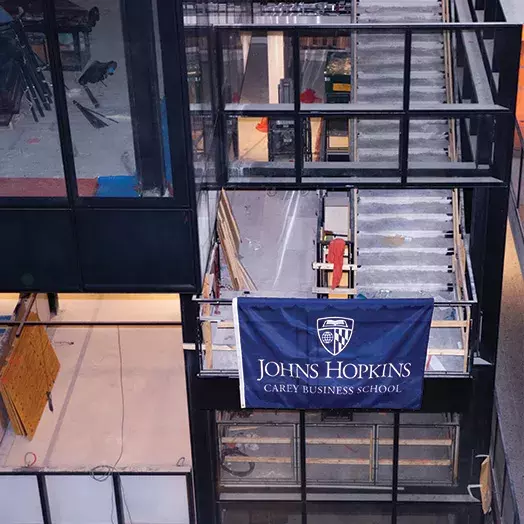
online programs
- How to apply
- How to apply: Full-time MS
- How to apply: Full-time MBA
Graduate School

Writing Sample
Some degree programs require uploading a writing sample with the admission application in the space provided. Please be sure to review the document before uploading and submitting the application. Writing samples should be written in English unless otherwise noted. The page limit does not include bibliography or title page. The Graduate School has no specific formatting requirements; however, each department or program may have set their own. An applicant may upload a revised version of the writing sample before the deadline. After the deadline, no revised documents will be accepted.
For any questions about the writing sample, please contact the department or program directly. Prior to submitting, please review file upload requirements .
Requirements
If a writing sample is required, it will be listed in the degree program’s requirements on the fields of study page. Also, the online application will prompt you to upload a writing sample only if it is required by the department or program you have selected.
Writing samples are required for the following:
- Anthropology : Sample of written work, 25 page maximum
- Architecture (Ph.D. only): At least three samples of written work, no page limit. Please save as one file and compress; file size is limited to under 25 MB.
- Art and Archaeology : Sample of written work, 25 page maximum, plus illustrations up 10 MB.
- Classics : Sample of written work, 25 page maximum
- Comparative Literature : Sample of written work, 25 page maximum
- East Asian Studies : Sample of written work, 25 page maximum
- Economics : Sample of written work, 25 pages maximum
- English : Sample of written work, approximately 25 pages
- French & Italian: Sample of written work, 25 page maximum, preferably in French
- German : Sample of written work, circa 20 pages
- History : Sample of academic writing, 25-35 pages
- History of Science : Sample of academic writing, 25-35 pages
- Musicology : Sample of written work, 25 page maximum
- Music Composition : Sample of written work recommended, 25 page maximum
- Near Eastern Studies : Sample of written work, 25 page maximum
- Philosophy : Sample of written work, 5,000 to 10,000 words
- Politics : Sample of written work, 25 page maximum
- Population Studies : Sample of written work recommended, 25 page maximum
- Religion : Sample of written work (9000 word maximum) that is relevant to the proposed academic subfield
- Slavic Languages and Literature : Sample of written work, 25 page maximum
- Sociology: Sample of written work, 25 page maximum
- Spanish and Portuguese: Sample of written work, 15-25 page essay on any literary and/or cultural topic, written in Spanish or Portuguese
- Princeton School of Public and International Affairs (Ph.D.): Sample of written work, 25 page maximum
How to Choose a Writing Sample for Your Graduate School Application

By ProFellow Founder, Dr. Vicki Johnson
I mentor graduate school applicants in my Fully Funded Course and Mentorship Program who are seeking to enter fully funded PhD and master’s programs . Many graduate programs require applicants to submit a writing sample, so I often receive questions, such as “What kind of writing sample should I submit?” I’d like to provide some insights on how selection committees evaluate writing samples so you can choose a piece of writing that gives you the best possible chance of being admitted into your ideal graduate program.
A writing sample, much like a transcript or recommendation letter, is a way to gauge your potential to succeed in a graduate program. Admissions committees will look to your writing sample to learn about how you engage with new ideas, participate in current conversations in your field, structure your research, and articulate a theory or argument. They also use this component to assess your academic writing and critical thinking skills. The faculty aims to choose applicants who have the pre-requisite skills to be successful and whom they know they will be able to effectively mentor.
Tips for Choosing an Appropriate Writing Sample
#1 choose a writing sample that reflects the type of writing you will do in your graduate program.
Some graduate programs are research-based, while others are professional or creative in nature. Your writing sample should be representative of the kind of writing, analysis, research or publications you hope to achieve as a graduate student. This will provide the admissions committee with a clear understanding of how you might fit into their program. If you are applying to a research-based graduate program, such as Ph.D. or Master of Science , your writing sample should demonstrate your experience preparing research papers. Likewise, if you are applying to a professional program, such as a Master’s in Business Administration (MBA) or Master’s in Public Administration (MPA) , then a paper that demonstrates your experience preparing business case studies or policy analysis, respectively, would be relevant options. For a Master’s of Fine Arts in Creative Writing , your best creative writing sample should be included. For a Journalism program, a long-form journalistic article would be best. In other words, do not submit a writing sample that does not reflect the nature of the work you will be doing in your graduate program!
#2: Don’t write something new, but update your writing sample if necessary
Your writing sample will most likely be taken from a paper or thesis prepared and reviewed by professors during your most recent college experience, whether that was for a bachelor’s or master’s degree. Excerpts from a senior capstone class or master’s thesis can work well, but any paper that shows careful engagement with important ideas in your field (and meets the minimum length requirement!) is worth consideration. If you received a top grade on your paper during your studies, then it likely does not need improvement and can be submitted as-is. However, you can take feedback that you received from your grader to improve the paper structure, address unanswered questions, or add new citations (just don’t go overboard changing the paper!)
Most importantly, I would not recommend composing a new writing sample from scratch just for the purpose of your application, especially if you do not have the time or means to get feedback from a professor. Developing a new writing sample might also distract you from focusing on the preparation of other important pieces of your application, like your personal statement . A paper in the discipline you will be studying is ideal, but if your best paper is from a different discipline, or the subject or conclusion is outdated, it is ok to submit as long as it is well-written (according to your grader) since the selection committee is most concerned with assessing your writing, research and analytical skills, not your expertise in the subject of your future degree.
#3 Choose a writing sample that is academic in nature
Unless you are applying to a graduate program in creative writing or journalism, your writing sample should be academic in nature, showing a scholarly engagement with ideas. Avoid submitting essays, memoirs, blog or newspaper articles, or op-eds that you have written and instead choose papers you have prepared for your coursework. Think about the specific research that you have done and what you have contributed to your field so far, and choose a sample that showcases your ability to synthesize a lot of information and introduce new ideas.
Make sure that your writing sample does not simply summarize previous research. Be sure to emphasize your ideas and your argument while also placing them in a very particular pre-existing conversation in your field. You want your selection committee to have enough context for your writing sample to know how they might guide you to grow as a researcher, writer, and scholar, but you also want them to recognize your potential to be an active and effective voice in your field.
Final tip: Read the instructions!
Even if you are applying for several graduate programs in the same field, different universities tend to have varying requirements when it comes to writing samples. Some want up to ten pages; others allow up to twenty. In other instances, more than one writing sample will be requested. Be sure to narrow down your options of where you are applying before you begin to get into the nitty-gritty of selecting and editing your writing samples. Making sure that you are totally clear on the expectations of your writing sample can save you a significant amount of time in the long run!
Applying to graduate school and seeking funding opportunities? Get our FREE Directory of Fully Funded Graduate Programs and Full Funding Awards here!
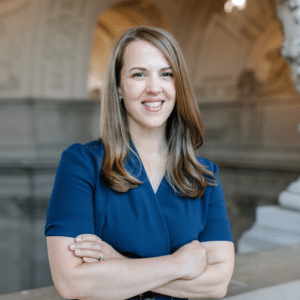
© ProFellow, LLC / Vicki Johnson 2021, all rights reserved.
Related Posts:
- My Friend Got In to Grad School, I Didn’t. Were They a Diversity Pick?
- How to Prepare a Creative Writing Sample for Graduate Programs
- Fully Funded PhD Programs in Creative Writing
- What to Do if You Don't Have Anyone to Write You a Recommendation Letter
- 5 More Powerful Personal Statement Openings of Fellowship Winners
Dr. Vicki Johnson , Fully Funded , Graduate School Application Tips
The Paul and Daisy Soros Fellowships for New Americans Experience
Fully funded master’s programs in computer science, find and win paid, competitive fellowships.
Be alerted about new fellowship calls for applications, get insider application tips, and learn about fully funded PhD and graduate programs
Fellowship Resources
- Calls for Applications
- Upcoming Fellowship Deadlines
- Fellowships Database
- Interviews with Fellows
- International Fellows Network
- Graduate Funding Directory
Fellowship Tips
- What is a Fellowship?
- Fully Funded Course
- Graduate School Funding
- Fellowship Application Tips
- Fulbright Application Tips
- Fellowship Application Guide
- Our Mission, History & Values
- ProFellow Winner Testimonials
- Fully Funded Course Testimonials
- Fellowship Industry Report
- Advertise With Us
- Terms & Privacy
ProFellow is the go-to source for information on professional and academic fellowships, created by fellows for aspiring fellows.
©2011-2024 ProFellow, LLC. All rights reserved.
- Request Info
- Student Experience

Experience our close community with a campus tour, connect with admissions counselors or apply now.
Creighton is within your reach. Explore financial aid options, calculate your costs and discover scholarships.
Explore our vibrant campus life with diverse student activities, supportive resources and a strong sense of community.
Learn about Creighton’s rich history, commitment to Jesuit, Catholic values, and dedication to academic excellence.
- Site Search
- School of Dentistry
- School of Law
- Heider College of Business
- School of Medicine
- School of Pharmacy and Health Professions
- College of Arts and Sciences
- Graduate School
- College of Professional and Continuing Education
- College of Nursing
- Jesuit Community
- Application Process
- Deciding on Grad or Professional School
- Financing Your Advanced Degree
- Programs & Careers
- Student Success
- Pharmacy and Health Professions

How to choose a writing sample for graduate school

If you’re serious about pursuing a post-bachelor’s degree, it’s never too early to start gathering all the materials you’ll need. Most programs will ask you to submit one of the following: an essay response to a prompt or a writing sample. If you’re in need of guidance on the latter, keep reading for advice on how to select and prepare an impressive writing sample for your graduate school application.
We gathered expert insight from Dr. James R. Martin, an associate professor and assistant director of interdisciplinary leadership at Creighton University. Dr. Martin has reviewed hundreds of applications throughout his career, so consider his advice about what makes a great graduate school writing sample. But first, it’s important to understand the purpose of this application element.
What is a writing sample for grad school and why is it important?
Writing samples are a key part of most grad school applications. They show the admissions committee the quality of your previous work and demonstrate interest and proficiency in your chosen field.
According to Dr. Martin, reviewers are generally evaluating samples for the following criteria:
- Solid writing skills : Is all spelling and grammar accurate? Is it free of typos?
- Organization and clarity : Is there a logical flow to the ideas presented? Is the purpose of the sample clearly identified and accomplished?
- Critical thinking : Does it demonstrate a thorough understanding of the topic, including consideration of alternate theories or approaches? Are all claims backed by reliable research?
- Consistent citations and references : Have sources been properly cited throughout the work? Do all citations have a corresponding reference?
How to choose a writing sample for grad school
Some schools don’t specifically state what kind of writing sample they are seeking. In that case, it’s best to err on the side of academic work. Some common writing sample examples include essays, dissertations, theses, journal articles, capstone projects or research papers. If possible, you want to submit a piece that demonstrates your proficiency in analyzing a topic in the same (or related) field as the program for which you are applying.
There are some professions and corresponding graduate school programs that accept work-related writing samples, such as white papers, policy briefs, news articles and grant applications. If you’re pursuing higher education in marketing, communications, public relations, public policy or other similar fields, these could be good writing sample ideas.
However, Dr. Martin cautions prospective students to vet their choices carefully. If you do send in materials you wrote for work, make sure you’re the only author — and write a secondary note explaining the context and authorship. After all, reviewers are evaluating you , not your team.
How long should a writing sample be?
There’s no simple answer for this question, as the target length depends on the program you’re applying for. The importance of reading and following all of the instructions carefully throughout your application cannot be overstated.
If your desired school doesn’t state specific requirements, Dr. Martin advises choosing an academic paper. Or better yet, you can take the initiative to reach out for clarification.
“Most departments have a director of graduate studies or admissions specialist who would be happy to have a conversation,” he says. “This interaction could end up working in your favor down the line.”
Components of a good graduate school writing sample
Now that you know how you will be evaluated and what kind of sample to submit, you need to make sure your work is as polished as possible. Whether you choose an academic paper or other professional work, apply these writing sample tips before submitting:
- Have someone you trust read it and provide feedback that you can choose whether or not to implement.
- Run the entire paper through a spelling and grammar check multiple times. You could also consider using a free tool like the one available at Grammarly.com .
- Make sure there are no typos, formatting discrepancies, comments or tracked changes, run-on sentences, repeated paragraphs, etc., in the final version.
- Rename your document to include important information that will make it easier for busy admissions staff to find. (Try using the following example: Writing sample_Name of applicant_Title of paper or project.)
- •Make sure your citation style is consistent and correct throughout the entire document.
Your writing sample format will vary depending on the type of sample you choose. But if you are submitting an academic paper, make sure it contains all of the following sections, at minimum:
- Introduction
- List of references
Craft a solid grad school application
With the tips stated above, you should have everything you need to begin choosing and refining your writing sample for graduate school. If you’re still not feeling confident, take the following advice to heart:
“Remember that the writing sample is just one piece of your application, and we evaluate it as a whole,” Dr. Martin shares. “As a Jesuit school we strive to meet people where they are. We want to help them succeed.” Now that you have some writing sample examples and advice, you can focus on other important elements of your application. Check out our article “ How to Secure the Best Letters of Recommendation for Grad School .”
If you’re looking for a high-quality and best value graduate school program, review the requirements for Creighton University by visiting our How to Apply page .
Considering grad school?
Regardless of where you are in your journey, our admissions advisors are ready to help you take the next step.
Related Blogs

Ultimate Guide to Applying for Law School: Insider Tips that Boost Your Chances
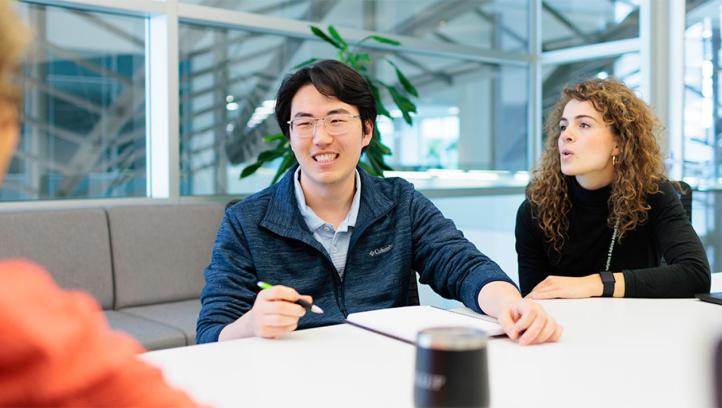
How to Secure Great Letters of Recommendation for Grad School


6 Tips for Perfecting Your Resume for Graduate School Application

Essay Papers Writing Online
Writing an outstanding graduate school essay – insider tips from experts.

Are you ready to embark on the next stage of your academic journey? As you contemplate pursuing a graduate degree, it’s crucial to recognize the significance of your statement of purpose. This essential document serves as your opportunity to stand out among the highly competitive pool of applicants and persuade the admissions committee why you belong in their esteemed program.
While the thought of distilling your accomplishments, goals, and motivations into a single essay may seem intimidating, fear not! With a strategic approach, you can create a captivating statement of purpose that showcases your unique qualities and potential contributions to your chosen field.
One key strategy to master is storytelling. Rather than simply listing your achievements and aspirations, weave a narrative that engages the reader and conveys your passion. By sharing experiences that have shaped your academic trajectory and personal growth, you can craft a compelling narrative that demonstrates your commitment and drive.
How to Make Your Grad School Essay Stand Out
Ensuring that your grad school essay catches the attention of the admissions committee is crucial to increasing your chances of acceptance. To achieve this, it is important to focus on crafting a unique and compelling essay that showcases your individuality, strengths, and potential contributions to the academic community.
One strategy is to begin your essay with a captivating anecdote or personal story that relates to your field of study or demonstrates your passion and dedication. This approach can help to engage the reader from the very beginning and create a memorable impression.
Another way to make your grad school essay stand out is to showcase your research and academic accomplishments. Highlighting any relevant publications, research projects, or awards can demonstrate your commitment to your chosen field and establish your credibility as a prospective graduate student.
Furthermore, it is important to tailor your essay to the specific program or institution you are applying to. Researching the program and understanding its unique qualities and values can allow you to effectively demonstrate how your own goals and aspirations align with those of the program, making your essay more compelling and convincing.
Additionally, focusing on your future goals and aspirations can help to demonstrate your motivation and potential for success in graduate school. Clearly articulating how the program will help you achieve your career objectives can showcase your ambition and dedication, distinguishing you from other applicants.
In conclusion, crafting a grad school essay that stands out requires a combination of creativity, research, and self-reflection. By showcasing your unique qualities, academic achievements, and future goals, you can create a compelling essay that grabs the attention of the admissions committee and increases your chances of being accepted into your desired graduate program.
Why a compelling opening is crucial
Having an attention-grabbing introduction is essential when it comes to writing a standout essay for graduate school admissions. The beginning of your essay sets the tone for the entire piece, capturing the reader’s interest and making them want to keep reading. It is the first impression you make on the admissions committee, and it can make a significant impact on their decision-making process.
A compelling opening establishes your voice and demonstrates your ability to engage the reader. It showcases your writing skills and creativity, indicating that you possess the qualities necessary for success in graduate school. An impressive introduction helps you stand out from the competition and makes your essay memorable.
Moreover, a strong opening can also help to establish a connection with the reader. It can evoke emotions, create empathy, or raise thought-provoking questions that stimulate their interest. By capturing their attention from the beginning, you have a better chance of keeping them engaged throughout your essay.
Additionally, a well-crafted introduction should provide a glimpse into your motivation for pursuing a graduate degree. It should convey the reasons behind your choice and highlight your passion and commitment to the field. By communicating your genuine interest and dedication, you present yourself as a desirable candidate to the admissions committee.
In conclusion, a compelling opening is crucial for a successful grad school essay. It sets the tone, showcases your writing skills, and establishes a connection with the reader. By crafting an attention-grabbing introduction, you increase your chances of making a positive impression and standing out among other applicants. So, take the time to develop an engaging beginning that captures the reader’s interest and leaves a lasting impact.
Highlight your unique experiences and achievements

Shine a light on the aspects of your life that make you stand out from other applicants by highlighting your unique experiences and achievements. Show the admissions committee the qualities, skills, and talents that make you a compelling candidate for their graduate program.
When writing your grad school essay, consider the different experiences you have had that have shaped you as an individual. Maybe you have lived in different countries or have volunteered in a unique community service program. Highlight these experiences and explain how they have influenced your worldview and your desire to pursue advanced education.
Besides experiences, also focus on your achievements. Have you received any awards or recognition for your work? Have you published any research or articles? Have you completed any notable projects that demonstrate your skills and abilities? These achievements can help demonstrate your commitment and ability to succeed in graduate school.
It’s important to remember that while talking about your experiences and achievements, you should also tie them back to your goals and aspirations for graduate school. Show how these experiences have motivated you to pursue further education and how they have prepared you for the challenges and opportunities that lie ahead.
In conclusion, when writing your grad school essay, don’t shy away from showcasing your unique experiences and achievements. They can help differentiate you from other applicants and demonstrate your potential as a graduate student. Use specific examples and vivid language to paint a clear picture of who you are and what you have to offer to the graduate program you are applying to.
Showcase your passion and commitment for the subject
One of the most important aspects of writing an effective grad school essay is to showcase your genuine passion and unwavering commitment for the subject you are applying for. Admissions committees are not just looking for applicants who meet the academic requirements; they want to see individuals who are truly passionate about their chosen field of study.
When writing your essay, it is essential to convey your enthusiasm and dedication in a compelling way. You can achieve this by sharing personal anecdotes that illustrate how you discovered your passion for the subject and how it has shaped your academic and professional aspirations. By painting a vivid picture of your journey, you can help the admissions committee understand why you are the ideal candidate for their program.
Furthermore, it is vital to demonstrate your commitment to the subject by highlighting your relevant experiences and achievements. This could include internships, research projects, publications, or any other activities that demonstrate your active involvement within the field. Showcasing these accomplishments not only highlights your dedication but also provides tangible evidence of your abilities and potential for success in graduate school.
In addition to describing your experiences, it is essential to explain how these experiences have influenced your goals and aspirations. What specific lessons did you learn? How have these experiences shaped your understanding of the subject? By reflecting on these questions, you can provide deeper insights into your passion and commitment, showing the admissions committee that you have a thoughtful and informed understanding of your chosen field.
Finally, while it is crucial to showcase your passion and commitment, it is equally important to maintain a professional and concise writing style. Avoid excessive enthusiasm or exaggeration; instead, focus on presenting your genuine interest and dedication in a clear and concise manner. Strive to strike a balance between showcasing your passion and commitment while also demonstrating your ability to communicate effectively and professionally.
In conclusion, showcasing your passion and commitment for the subject is essential in writing an effective grad school essay. By sharing personal anecdotes, highlighting relevant experiences, explaining the lessons learned, and maintaining a professional tone, you can convince the admissions committee that you are not only passionate but also well-prepared to contribute to their program.
Emphasize your potential for future success
Highlighting your potential for future success is crucial when writing your graduate school essay. This section allows you to showcase your unique qualities, skills, and experiences that make you stand out as a candidate.
- Focus on your achievements: Demonstrate your past accomplishments and how they have shaped your character and professional aspirations. Highlight any leadership roles, academic awards, research projects, or internships that have contributed to your growth and development.
- Showcase your passion: Share your genuine passion for your field of study and your drive to make a meaningful impact. Discuss specific experiences or events that have inspired you and how they have influenced your career goals.
- Highlight your skills: Identify the key skills and strengths that will enable you to succeed in your chosen field. Whether it’s critical thinking, problem-solving, communication, or teamwork, provide examples of how you have demonstrated these skills in the past.
- Outline your future goals: Clearly articulate your short-term and long-term goals and how attending graduate school will help you achieve them. Explain how your previous experiences and skills have prepared you for these goals and how the graduate program aligns with your future plans.
- Demonstrate your dedication: Show your commitment to your field of study by discussing any relevant extracurricular activities, volunteer work, or professional experiences. Highlight your ability to balance multiple responsibilities and how you have gone above and beyond to pursue your passion.
This section of your graduate school essay allows you to paint a picture of your potential for future success. By showcasing your achievements, passion, skills, goals, and dedication, you can convince the admissions committee that you are not only qualified for the program but also have the drive and potential to excel in your field.
The importance of proofreading and editing
Ensuring the accuracy and clarity of your writing is essential when it comes to presenting your ideas effectively in a graduate school essay. That’s why proofreading and editing play a crucial role in the writing process. They go beyond simply checking for spelling and grammar errors, and involve reviewing and revising your content to improve its overall quality.
Proofreading involves carefully reading through your essay to identify any errors or inconsistencies. This includes checking for spelling mistakes, grammatical errors, and punctuation errors. It also involves reviewing the structure and flow of your sentences and paragraphs to ensure they are clear and coherent.
Editing, on the other hand, focuses on making revisions to improve the content and style of your essay. This includes clarifying your ideas, removing any unnecessary or repetitive information, and rephrasing sentences for clarity and conciseness. Editing also involves checking the overall organization and structure of your essay to ensure it follows a logical and cohesive format.
The importance of proofreading and editing cannot be overstated. When you take the time to carefully review and revise your work, you can eliminate any errors or weaknesses that may weaken your argument or confuse your readers. By ensuring your writing is clear, concise, and well-structured, you can effectively convey your ideas and make a strong impression on the admissions committee.
Proofreading and editing also help you to improve your writing skills. By carefully reviewing your work and identifying areas for improvement, you can learn from your mistakes and grow as a writer. It allows you to develop a critical eye and attention to detail, which are valuable skills that can benefit you not only in your graduate studies but also in your future career.
In conclusion, proofreading and editing are essential steps in the writing process for a graduate school essay. They ensure the accuracy, clarity, and overall quality of your writing, allowing you to effectively convey your ideas to the admissions committee. Additionally, they help to improve your writing skills and develop important attention to detail. So take the time to thoroughly proofread and edit your essay to make it the best it can be.
Related Post
How to master the art of writing expository essays and captivate your audience, convenient and reliable source to purchase college essays online, step-by-step guide to crafting a powerful literary analysis essay, unlock success with a comprehensive business research paper example guide, unlock your writing potential with writers college – transform your passion into profession, “unlocking the secrets of academic success – navigating the world of research papers in college”, master the art of sociological expression – elevate your writing skills in sociology.
- DACA/Undocumented
- First Generation, Low Income
- International Students
- Students of Color
- Students with disabilities
- Undergraduate Students
- Master’s Students
- PhD Students
- Faculty/Staff
- Family/Supporters
- Career Fairs
- Post jobs, internships, and fellowships
- Build your brand at MIT
- Recruiting Guidelines and Resources
- Connect with Us
- Career Advising
- Distinguished Fellowships
- Employer Relations
- Graduate Student Professional Development
- Prehealth Advising
- Academia & Education
- Architecture, Planning, & Design
- Arts, Communications, & Media
- Business, Finance, & Fintech
- Computing & Computer Technology
- Data Science
- Energy, Environment, & Sustainability
- Life Sciences, Biotech, & Pharma
- Manufacturing & Transportation
- Health & Medical Professions
- Social Impact, Policy, & Law
- Getting Started & Handshake 101
- Exploring careers
- Networking & Informational Interviews
- Connecting with employers
- Resumes, cover letters, portfolios, & CVs
- Finding a Job or Internship
- Post-Graduate and Summer Outcomes
- Professional Development Competencies
- Preparing for Graduate & Professional Schools
- Preparing for Medical / Health Profession Schools
- Interviewing
- New jobs & career transitions
- Career Prep and Development Programs
- Fall Career Fair
- Employer Events
- Outside Events for Career and Professional Development
- Events Calendar
- Career Services Workshop Requests
- Early Career Advisory Board
- Peer Career Advisors
- Student Staff
Graduate School Application Essays
- Share This: Share Graduate School Application Essays on Facebook Share Graduate School Application Essays on LinkedIn Share Graduate School Application Essays on X
Types of Essays
Regardless of the type of school you are applying to, you will be required to submit an admissions essay as part of the application process. Graduate programs want students with clear commitment to the field. Essay prompts typically ask applicants to discuss their previous experience, future professional goals, and how the program can help them in achieving those objectives. The essay gives the applicant the chance to articulate these goals and display strong writing skills. Remember to tailor your essay to each school and the faculty committee that reviews your application. But first, take note of what kind of essay is being requested of you. Here are the two main admission essays:
Personal Statement
A personal statement is a narrative piece describing how your character and experiences have formed you into someone who will contribute positively and effectively to not only the department but the academic discipline as a whole. This is often achieved by detailing social, educational, cultural, and economic obstacles you have overcome in your journey to get to where you are today and your future objectives. A personal statement is also an opportunity to highlight what is unique about you and how you will advance diversity within the institution.
Check out Personal Statement Resources for Graduate School Applications in the Resources section of Handshake for a brainstorming activity and essay samples that can help you get started on your personal statement.
Statement of Purpose
Interchangeably called a “research statement”, a statement of purpose will prompt you to describe your research interests and professional goals, how you plan to accomplish them, and why a specific program is best suited for you to do so. Be specific about your specialized interests within your major field. Be clear about the kind of program you expect to undertake, and explain how your study plan connects with your previous training and future goals.
Use the Outlining Your Statement of Purpose guide in the Resources section of Handshake to get started on your statement outline.
How to Write a Powerful Admission Essay
Whatever required format, your essay should be thoughtful, concise, compelling, and interesting. Remember, admissions officers read hundreds of personal essays. Below are some tips for your admissions essay writing process:
Before Writing
- Read the question: Be sure you are aware of all aspects of the prompt. Failing to pay attention to details in the prompt won’t reflect well on you as a potential candidate.
- What is distinct, special, and/or impressive about me and my life story?
- Have I overcome any particular hardships or obstacles?
- When did I become interested in this field and what have I learned about it?
- What are my career goals?
- What personal traits, values, and skill sets do I have that would make me stand out from other applicants?
- Create an outline: You might have a lot that you want to say, but you will need to whittle down your many thoughts and experiences to a concrete thesis with a select number of examples to support it. Create an outline for your draft, not only to organize your points and examples, but to help tailor your essay for your readers.
- Know your audience: Consider how your narrative can best meet the expectations of admissions committee members. Will faculty be reading this? Administrators? Experts in the field? Knowing your audience ahead of time will assist you in addressing the prompt appropriately.
While Writing
- Grab your reader’s attention: Start your essay with something that will grab the reader’s attention such as a personal anecdote, questions, or engaging depiction of a scene. Avoid starting things off with common phrases such as “I was born in…” or “I have always wanted to…” Consider the experiences that have shaped you or your career decision, and delve into them with a creative hook.
- Write well: Your essay is a sample of your writing abilities, so it’s important to convey your thoughts clearly and effectively. Be succinct—you don’t need to write out your full autobiography or resume in prose. Exclude anything that doesn’t support your thesis. Gentle humor is okay, but don’t overdo it. Also, don’t make things up! Be honest about your experiences.
- End strong: End your essay with a conclusion that refers back to the lead and restates your thesis. This helps unify your essay as a whole, connecting your detailed experiences back to the reason you are writing this essay in the first place—to show your qualifications for your graduate program of choice.
Final Touches
- Use resources: The MIT Communication Labs have a CommKit that collects all of the Comm Lab resources relevant to the grad application process , including recommendation letters & interviews
- Revise: Give yourself enough time to step away from your draft. Return with a fresh pair of eyes to make your edits. Be realistic with yourself, not your harshest critic. Make a few rounds of revisions if you need.
- Ask for help: Have your essay critiqued by friends, family, educators, and the MIT Writing and Communication Center or our Career Services staff.
- Proofread: Read your essay out loud or even record yourself and listen to the recording, to help you catch mistakes or poor phrasing you may have missed when reading to yourself. Also, don’t rely exclusively on your computer to check your spelling.

The Writing Sample for Graduate School

Applying to graduate school and choosing academic writing that showcases your academic excellence can be challenging. Don’t worry! Although your writing sample is crucial, it doesn’t need to be perfect. It should effectively communicate, demonstrate your potential for advanced academic work, and importantly, show your ability to specialize in a program’s field of interest. We offer tips to help you select the best writing sample for your graduate school.
Use an Appropriate Professional Style Guide
Your writing sample should show topical expertise, but also an understanding of professional research. Find the standard style guide for your chosen field, and make sure it’s applied consistently–not just citations, but also any formatting for cover pages, pages numbers, and bibliographies.
Keep it Relevant
Select a sample that closely reflects your areas of potential interest. This means the sample with the highest grade may not be the best. It may be worthwhile to revise a B+ paper and use it a writing sample if it’s more relevant to the field you want to study than that A paper from a different academic area.
Take your time!
If there’s no obvious pick that’s OK. Don’t rush when selecting a writing sample. Instead, take some time to review your options–pick something that will make an impression on the admissions committee, and don’t be afraid to revise. You may be tempted to write something new for submission – this is almost always a bad idea. Remember that previous work has been written for a reason and has likely seen feedback from trusted advisors.
Make Sure it is Free of Errors
As already hinted, you may need to edit the sample you choose. Remember you want to express your professional readiness for advanced studies with your writing sample, so triple check for typographical and other errors before submitting it with your application package.
Follow the Instructions!
Pay close attention to any requirements set out for you application materials, and make sure you meet the required length. Typically, you don’t want to exceed them either–more is not always better. Remember that graduate applications are also about showing that you can follow directions.
Structure and Organization Matter!
Academic writing should be a well written with a concise beginning, clear middle and an effective end. Make sure that each part of your essay is clear, compelling, and, well, present in your writing sample. Even the most brilliant ideas and research get lost in a poorly structured essay.
Showcase Your Research Skills!
This can take different forms depending on your field. If you’re applying to an experiment-driven program in physics or sociology you may need to demonstrate your grasp of research best practices in field. In a scholarly program such as history or literature you may need to demonstrate a meaningful grasp of research with primary documents, or applying specific methodologies in analysis.
Demonstrate Your Critical Thinking
A strong writing sample showcases your critical thinking skills, which means evaluating the strengths and weaknesses of a prevailing view and drawing conclusions based on evidence. Your writing should engage with existing work in the field. In the writing sample, you show the reader what you already know and what questions you want to explore.
Reveal Yourself as an Effective Communicator
Finally, choosing a well-written academic paper for your application involves communicating complex ideas effectively, whether your own or others’ (with proper attribution). The best samples balance engaging with existing ideas and introducing your own. This balance is crucial for grad school success, offering a chance to showcase this skill and engage your reader through your writing sample .
In conclusion, we know that applying for graduate school can be a stressful process. We’re here to help you navigate the ups and downs. Check out more helpful tips and articles demystifying graduate school admissions on our blog . Looking for help with your application essays? We have samples of real Personal Statements that got people accepted to graduate programs – with our expert feedback to help you write your essays. Need more help? Consider a Magoosh Premium Plan to access more application essay examples, expert GRE support, and best in the field GRE prep.

View all posts
More from Magoosh

Leave a Comment
Please leave any questions or suggestions in the comments, we try our best to respond within a few days! Your email address will not be published.
Leave a Reply Cancel reply
Your email address will not be published. Required fields are marked *
Testimonials
Free Resources
PrepScholar GRE Prep
Gre prep online guides and tips, 7 successful statement of purpose examples.
Not sure what graduate schools are looking for in a statement of purpose? Looking at successful graduate school statement of purpose samples can help! In this guide, we’ll orient you to what makes a great statement of purpose or letter of intent for graduate school. Then we’ll provide you with four successful statement of purpose examples from our graduate school experts. We’ll also provide analysis of what makes them successful. Finally, we’ll direct you to even more helpful examples that you can find online!
The Graduate School Statement of Purpose: An Overview
A statement of purpose (also called a letter of intent or a research statement) introduces your interests and experience to the admissions committee. For research-focused programs, like most PhDs and many master’s degrees, your statement of purpose will focus primarily on your past research experience and plans. For more professionally-focused graduate programs, your statement of purpose will primarily discuss how your pursuit of this professional program relates to your past experiences, and how you will use the skills from the program in your future career.
A statement of purpose for grad school is also where you sell the admissions committee on why you belong in their program specifically. Why do you fit there, and how does what they offer fit your interests?

What’s in a Great Grad School Statement of Purpose?
Here are the essential elements of a strong graduate school statement of purpose:
Clear Articulation of Goals and Interests
A strong statement of purpose will clearly and specifically lay out your goals in undertaking the program and what you hope to accomplish with the degree. Again, for a research-focused program, this will focus primarily on the research project(s) you want to undertake while you are there. For a more professional program, discuss what interests you within the professional field and what skills/knowledge you hope to gain through the program.
Quick side note: we've created the world's leading online GRE prep program that adapts to you and your strengths and weaknesses. Not sure what to study? Confused by how to improve your score? We give you minute by minute guide.
You don't NEED a prep program to get a great GRE score. But we believe PrepScholar is the best GRE prep program available right now , especially if you find it hard to organize your study schedule and don't know what to study .
Click here to learn how you can improve your GRE score by 7 points, guaranteed .
You should be as specific as possible in discussing what interests you. Use examples of particular phenomena, tools, or situations that you find exciting. If you are vague or say that everything in the field interests you, you run the risk of seeming unfocused or not actually that passionate.
Don’t worry that being too specific will box you into a particular research area or subfield during your entire tenure in graduate school. Your program understands that interests change—they won’t be pulling out your research statement to cross-reference with your dissertation proposal!
Evidence of Past Experience and Success
A great graduate school statement of purpose will also show programs that you have already been successful. They want applicants that will be able to follow through on their research/professional plans!
To this end, you’ll need to provide evidence of how your background qualifies you to pursue this program and your specific interests in the field. You’ll probably discuss your undergraduate studies and any professional experience you have. But be sure to draw on specific, vivid examples. You might draw on your thesis, major projects you’ve worked on, papers you have written/published, presentations you’ve given, mentors you’ve worked with, and so on. This gives admissions committees concrete evidence that you are qualified to undertake graduate study!

Interest and Fit With the Program
The third essential ingredient to a great statement of purpose is to clearly lay out why you and the program are a good fit. You should be able to identify both specific reasons why your work fits with the program and why the program suits your work/interests! Are there particular professors you’d like to work with? Does the department have a strong tradition in a certain methodology or theory you’re interested in? Is there a particular facet to the curriculum that you’d like to experience?
Showing that you and the program are a match shows that you chose the program thoughtfully and have genuine interest in it. Programs want to admit students who aren’t just passionate about the field. They want students who are genuinely enthused about their specific program and positioned to get the most out of what they have to offer.
Strong Writing
The final essential piece of a strong statement of purpose or letter of intent is strong writing. Writing skills are important for all graduate programs. You’ll need to demonstrate that you can clearly and effectively communicate your ideas in a way that flows logically. Additionally, you should show that you know how to write in a way that is descriptive but concise. A statement of purpose shouldn’t ever be longer than two pages, even without a hard word limit.
Admissions committees for humanities programs may be a little more focused on writing style than admissions officers for STEM programs. But even in quantitative and science-focused fields, written communication skills are an essential part of graduate school. So a strong statement of purpose will always be effectively written. You’ll see this in our statement of purpose for graduate school samples.

Real, Successful Statement of Purpose Samples
In this section, we’ll present four successful graduate school statement of purpose examples from our graduate school experts, along with a brief commentary on each statement. These statements come from a diverse selection of program types to show you how the core essentials of a statement of purpose can be implemented differently for different fields.
Note: identifying information for these statements have been changed—except for example four, which is my statement.
- Statement of Purpose Sample One: Japanese Studies MA

This statement of purpose is notable for its great use of space and its vivid descriptions. The author is able to cram a lot into about a page. She discusses how she came to her two primary research interests (and how they are connected). She integrates this discussion of her interests with information on her past experiences and qualifications for pursuing the course of study. Finally, she includes details on her goals in pursuing the program and components of the program that interest her. Her examples are specific and fleshed-out. There’s a lot very cleverly included in a small amount of page space!
Additionally, the language is very vivid. Phrases like “evocative and visceral” and “steadily unraveling,” are eye-catching and intriguing. They demonstrate that she has the writing skills necessary to pursue both graduate study and her interest in translation.
- Statement of Purpose Sample Two: Music MM
This sample is fairly long, although at 12 point Times New Roman it’s under two pages single-spaced. The length of this statement is partially due to the somewhat expansive nature of the prompt, which asks what role music has played in the applicant’s life “to date.” This invites applicants to speak more about experiences further in the past (in the childhood and teen years) than is typical for a statement of purpose. Given that this is for a master’s degree in music, this is logical; musical study is typically something that is undertaken at a fairly young age.
This statement does an excellent job describing the student’s past experiences with music in great detail. The descriptions of the student’s past compositions and experiences performing new music are particularly vivid and intriguing.
This statement also lays out and elaborates on specific goals the student hopes to pursue through the program, as well as features particular to the program that interest the student (like particular professors).

- Statement of Purpose Sample Three: Economics PhD

One of the first things you’ll likely notice about this statement is that it’s a little on the longer side. However, at 12 point Times New Roman font and single-spaced, it still comes in under 2 pages (excluding references). It makes sense for a PhD statement of purpose sample to be longer than a master’s degree statement of purpose—there’s more to lay out in terms of research interests!
The writing style is fairly straightforward—there’s definitely a stronger focus on delivering content than flashy writing style. As Economics is a more quantitative-focused field, this is fine. But the writing is still well-organized, clear, and error-free.
The writer also gives numerous examples of their past work and experience, and shows off their knowledge of the field through references, which is a nice touch.
- Statement of Purpose Sample Four: History of the Book MA
This is actually my statement of purpose. It was for a program that I got accepted to but did not end up attending, for a Master’s in the History of the Book. You’ll notice that the two essay prompts essentially asked us to split our statement of purpose into two parts: the first prompt asked about our research interests and goals, and the second prompt asked about our relevant experience and qualifications.
I’ll keep my comments on this graduate school statement of purpose sample brief because I’ll do a deep dive on it in the next section. But looking back at my statement of purpose, I do a good job outlining what within the field interests me and clearly laying out how my past experiences have qualified me for the program.
Obviously this statement did its job, since I was accepted to the program. However, if I were to improve this statement, I’d change the cliche beginning (“since I was a child”) and provide more specificity in what about the program interested me.

Deep Dive Analysis of a Sample Statement of Purpose for Graduate School
Next, we’ll do a paragraph by paragraph analysis of my statement, statement of purpose sample four. I’ll analyze its strengths and suggest ways I could shore up any weaknesses to make it even stronger.
Essay 1: Academic Interests
To refresh, here’s the first prompt: Please give a short statement that describes your academic interests, purpose, objectives and motivation in undertaking this postgraduate study. (max 3500 chars – approx. 500 words)
Want to improve your GRE score by 7 points? We have the industry's leading GRE prep program. Built by world-class instructors with 99th percentile GRE scores , the program learns your strengths and weaknesses through machine learning data science, then customizes your prep program to you so you get the most effective prep possible.
Try our 5-day full access trial for free:
Paragraph 1
Since I was a child, my favorite thing has always been a book. Not just for the stories and information they contain, although that is a large part of it. Mostly, I have been fascinated by the concept of book as object—a tangible item whose purpose is to relate intangible ideas and images. Bookbindings and jackets, different editions, the marginalia in a used book—all of these things become part of the individual book and its significance, and are worth study and consideration. Books and their equivalent forms—perfect bound, scrolled, stone tablets, papyrus—have long been an essential part of material culture and are also one of our most significant sources of information about the human historical past. Through both the literal object of the book, the words contained thereon, and its relationship to other books—forms of context, text and intertext—we are able to learn and hopefully manage layers of information with which we would otherwise have no familiarity.
First, the good: this paragraph does a good job introducing my academic interest in the book-as-object, and shows off pre-existing knowledge both of the study of material culture and literary theory. Additionally, the language is engaging: the juxtaposition of “tangible” and “intangible” in the beginning and phrases like “perfect bound, scrolled, stone tablets, papyrus” lend life to the writing and keep the reader engaged.
If I were to go back and improve this paragraph, first, I would absolutely change the first sentence to something less cliche than talking about my childhood. I might try something like “My love of books is a multifaceted thing. I don’t only love them for the stories and….” Second, I would chill out on the em dashes a little bit. Three sets in one paragraph is a little excessive. Finally, I might actually cut this paragraph down slightly to make more room word-wise later in the statement to discuss what specific things about the program interest me.

Paragraph 2
Furthermore, blogs, webcomics, digital archives, e-readers, and even social media sites like tumblr and Facebook have revolutionized the concept of the book by changing how we share and transmit ideas and information, just as the Gutenberg printing press revolutionized the book all those years ago in the fifteenth century. Once again there has been an explosion both in who can send out information and who can receive it.
This paragraph briefly and effectively introduces my other main academic interest: how new technology has changed the concept of the book-as-object. The tie-back to the printing press is a nice touch; it’s a vivid example that shows that I’m aware of important historical moments in book history.
Paragraph 3
I am deeply interested in the preservation of the physical book, as I think it is an important part of human history (not to mention a satisfying sensory experience for the reader). However I am also very concerned with the digitization and organization of information for the modern world such that the book, in all of its forms, stays relevant and easy to access and use. Collections of books, archives, and information as stored in the world’s servers, libraries and museums are essential resources that need to be properly organized and administered to be fully taken advantage of by their audiences. My purpose in applying to the University of Edinburgh’s Material Culture and History of the Book is to gain the skills necessary to keep all forms of the book relevant and functional in an age when information can move more radically than ever before.
This paragraph actually has a focus problem. Since it covers two topics, I should split it into two paragraphs: one on the integration of my two interests, and one on my goals and interests in the program. I could also stand to expand on what features the program has that interest me: professors I’d like to work with, particular aspects of the curriculum, etc.
In spite of these things, however, this paragraph does a good job clearly integrating the two academic interests related to the book I introduced in the first two paragraphs. And the language is still strong —“satisfying sensory experience” is a great phrase. However, I’ve been using the word “information,” a lot; I might try to replace with appropriate synonyms (like “knowledge”) in a couple of places.
Paragraph 4
Additionally, I intend on pursuing a PhD in Library and Information Sciences upon completion of my master’s and I feel that this program while make me uniquely suited to approach library science from a highly academic and interdisciplinary perspective.
This final paragraph offers just quick touch on my future goals beyond the program. It’s typically fine for this to be relatively brief, as it is here, just so long as you can clearly identify some future goals.

Essay 2: Relevant Experience
The second prompt just asked me to describe my relevant knowledge, training, and skills.
As a folklore and mythology student, I have gained a robust understanding of material culture and how it relates to culture as a whole. I have also learned about the transmission of ideas, information, stories and pieces of lore among and between populations, which is an important component of book history. Folklore is also deeply concerned with questions of the literary vs. oral lore and the tendency for text to “canonize” folklore, and yet text can also question or invert canonized versions; along with this my studies in my focus field of religion and storytelling have been deeply concerned with intertextuality. One of my courses was specifically concerned with the Heian-period Japanese novel The Tale of Genji and questions of translation and representation in post-Heian picture scrolls and also modern translations and manga. In addition to broader cultural questions concerned with gender and spirituality both in historical Japan and now, we considered the relationships between different Genji texts and images.
This is a strong, focused paragraph. I relate my academic background in Folklore and Mythology to my interests in studying the book, as well as showing off some of my knowledge in the area. I also chose and elaborated on a strong example (my class on the Tale of Genji ) of my relevant coursework.
I also have work experience that lends itself to the study of the book. After my freshman year of college I interned at the Chicago History Museum. Though I was in the visitor services department I was exposed to the preservation and archival departments of the museum and worked closely with the education department, which sparked my interest in archival collections and how museums present collection information to the public. After my sophomore year of college and into my junior year, I worked at Harvard’s rare books library, Houghton. At Houghton I prepared curated collections for archival storage. These collections were mostly comprised of the personal papers of noteworthy individuals, categorized into alphabetical folders. This experience made me very process-oriented and helped me to understand how collections come together on a holistic basis.
This paragraph also has a clear focus: my past, relevant work experience. Discussing archival collections and presenting information to the public links the interests discussed in my first statement with my qualifications in my second statement. However, if I were to revise this paragraph, I would add some specific examples of the amazing things I worked on and handled at Houghton Library. In that job, I got to touch Oliver Cromwell’s death mask! An interesting example would make this paragraph really pop even more.
Finally, in my current capacity as an education mentor in Allston, a suburb of Boston, I have learned the value of book history and material culture from an educational perspective. As a mentor who designs curriculum for individual students and small groups, I have learned to highly value clearly organized and useful educational resources such as websites, iPad apps, and books as tools for learning. By managing and organizing collections in a way that makes sense we are making information accessible to those who need it.
This final paragraph discusses my current (at the time) work experience in education and how that ties into my interest in the history of the book. It’s an intriguing connection and also harkens back to my discussion of information availability in the paragraph three of the first statement. Again, if I were to amp up this statement even more, I might include a specific example of a book-based (or book technology-based) project I did with one of my students. I worked on things like bookbinding and making “illuminated manuscripts” with some of my students; those would be interesting examples here.
This statement is split into two parts by virtue of the two-prompt format. However, if I were to integrate all of this information into one unified statement of purpose, I would probably briefly introduce my research interests, go in-depth on my background, then circle back around to speak more about my personal interests and goals and what intrigues me about the program. There’s not really one correct way to structure a statement of purpose just so long as it flows well and paragraphs are structured in a logical way: one topic per paragraph, with a clear topic and concluding sentence.

More Statement of Purpose Examples
We’ve provided you with four great graduate school statement of purpose examples from our graduate school experts. However, if you’re looking for more, there are other sample letters of intent and statements of purpose for graduate school online. We’ve rounded up the best ones here, along with some strengths and weaknesses about each example.
Majortests Statement of Purpose Sample
This is a fairly straightforward, clearly written statement of purpose sample for a biology program. It includes useful commentary after each paragraph about what this statement of purpose is accomplishing.
- This statement of purpose sample is well-organized, with clear topic sentences and points made in each paragraph.
- The student clearly identifies what interests her about the program.
- The student proactively addresses questions about why she hasn’t gone directly to graduate school, and frames her professional research experience as a positive thing.
- She gives a tiny bit of color about her personality in a relevant way by discussing her involvement with the Natural History Society.
- In general, discussing high school interests is too far back in time unless the anecdote is very interesting or unusual. The detail about The Theory of Evolution is intriguing; the information about the high school teacher seems irrelevant. The student should have condensed this paragraph into a sentence or two.
- While this statement is cogently written and makes the candidate sound competent and well-qualified, it’s not exactly the most scintillating piece of writing out there. Some of the constructions are a little awkward or cliche. For example, the “many people have asked me” sentence followed by “the answer is” is a little bit clunky. This is probably fine for a STEM program. But just be aware that this statement is not a paragon of writing style.
Want to improve your GRE score by 7+ points?
Check out our best-in-class online GRE prep program . We guarantee your money back if you don't improve your GRE score by 7 points or more.
PrepScholar GRE is entirely online, and it customizes your prep program to your strengths and weaknesses . We also feature 2,000 practice questions , official practice tests, 150 hours of interactive lessons, and 1-on-1 scoring and feedback on your AWA essays.
Check out our 5-day free trial now:
UC Berkeley History Statement of Purpose Sample
This is a graduate school statement of purpose example from the UC Berkeley History department’s PhD program, with annotations from a professor as to why it’s a successful statement.
- The author is able to very clearly and articulately lay out her research interests and link them to past work she has successfully completed, namely, her thesis.
- She is able to identify several things about the program and Berkeley that indicate why it is a good fit for her research interests.
- She addresses the time she spent away from school and frames it as a positive, emphasizing that her use of time was well-considered and productive.
- Her writing is very vivid, with excellent word choice and great imagery.
While very well-written and engaging, this sample statement of purpose for graduate school is a little bit on the long side! It’s a little over two single-spaced pages, which is definitely pushing the limits of acceptable length. Try to keep yours at 2 pages or less. Some of the information on the thesis (which comprises over half of the statement of purpose) could be condensed to bring it down to two pages.

Pharmacy Residency Letter of Intent Sample
This is not technically a sample letter of intent for graduate school because it’s actually for a pharmacy residency program. However, this example still provides illumination as to what makes a decent graduate school letter of intent sample.
- This is a serviceable letter of intent: the writer clearly lays out their own goals within the field of pharmacy, what qualifications they have and how they’ve arrived at their interests, and how the program fits their needs.
- The writing is clearly structured and well-organized.
- The main weakness is that some of the writer’s statements come across as fairly generic. For example, “The PGY-1 Residency Program at UO Hospitals will provide me with the opportunity to further develop my clinical knowledge, critical thinking, teaching, research, and leadership skills” is a generic statement that could apply to any residency program. A punchier, more program-specific conclusion would have amped up this letter.
- While the writer does a decent job providing examples of their activities, like working as a tutor and attending the APhA conference, more specificity and detail in these examples would make the statement more memorable.
- There’s a typo in the last paragraph —a “to” that doesn’t belong! This is an unprofessional blip in an otherwise solid letter. Read you own letter of intent aloud to avoid this!
NIU Bad Statement of Purpose Example
This is an ineffective graduate school statement of purpose example, with annotations on why it doesn’t work.
As you might imagine, the main strength in this document is as an example of what not to do. Otherwise, there is little to recommend it.
- The annotations quite clearly detail the weaknesses of this statement. So I won’t address them exhaustively except to point out that this statement of purpose fails at both content and style. The author includes irrelevant anecdotes and lists without offering a decisive picture of interests or any particular insight into the field. Additionally, the statement is riddled with grammatical mistakes, awkward sentence structures, and strange acronyms.
- You’ll note that the commentary advises you to “never start with a quote.” I agree that you should never start with a freestanding quote as in this example. However, I do think starting with a quote is acceptable in cases like the Berkeley history example above, where the quote is brief and then directly linked to the research interest.

Graduate School Statement of Purpose Examples: 4 Key Points
Graduate programs ask for statement of purpose to hear about your interests and goals and why you think you and the program would be a good fit.
There are four key elements to a successful statement of purpose:
- A clear articulation of your goals and interests
- Evidence of past experiences and success
- Interest and fit with the program
- Strong writing
We’ve provided you with four successful statement of purpose samples from our graduate school experts!
We also provided additional statement of purpose samples (and a sample letter of intent) for graduate school from other sources on the internet. Now you have all kinds of guidance!
What’s Next?
If you’re looking for more information on graduate school , see our guide to what makes a good GPA for grad school .
Not sure if you need to take the GRE ? See if you can get into graduate school without GRE scores .
Want more information about the GRE? We can help you figure out when to take the GRE , how to make a GRE study plan , and how to improve your GRE score .
Ready to improve your GRE score by 7 points?
Author: Ellen McCammon
Ellen is a public health graduate student and education expert. She has extensive experience mentoring students of all ages to reach their goals and in-depth knowledge on a variety of health topics. View all posts by Ellen McCammon

We're sorry but you will need to enable Javascript to access all of the features of this site.
Stanford Online
How to write a compelling statement of purpose for graduate school.

A statement of purpose (SOP) is a critical component of most graduate school applications, and are often required for various types of graduate level programs, including Graduate Certificates and Master’s Degrees .
An SOP offers you the opportunity to showcase your motivations, qualifications, and aspirations to a school’s Office of Admissions. Crafting an effective SOP requires careful planning and attention to detail. Whether you're applying to Stanford or any other institution, here's a guide on how to write a standout statement of purpose that shows how your goals align with the program's expectations.
Understanding the Prompt
A prompt's comprehensive nature offers you the chance to provide a holistic view of your journey, motivations, and aspirations. Be sure to check the websites of any programs you’re applying to, as they often have additional information or suggested frameworks to get you started.
Stanford Master’s Degree
If you are applying to a Stanford master’s degree program , the recommended maximum length for your SOP is 1,000 words and the prompt for the statement of purpose emphasizes several key elements:
- Reasons for applying
- Preparation for the field of study
- Research interests
- Future career plans
- Relevant aspects of your background
Stanford Graduate Certificate
If you are applying to take individual graduate courses or pursue a graduate certificate through Stanford Online, the prompt contains less elements than for the master’s program. This statement of purpose should be brief, as you’re limited to 4000 characters. You should summarize:
- Specific course work on your transcript that meets the course and or certificate prerequisites
- Relevant aspects of your professional experience
Tips for Writing your Statement of Purpose
After you fully understand the prompt for the program you’re applying to, use these tips to guide your writing:
- Be Concise and Focused Most institutions have maximum lengths for words or characters. With limited space, it's important to be concise and focused. Use each word purposefully to convey your message. Ensure that every paragraph adds value and contributes to your overall narrative.
- Start Strong Your opening should be attention-grabbing. Consider sharing a personal anecdote, a relevant quote, or a thought-provoking question that sets the tone for your SOP. Engaging the reader from the beginning can make your statement more memorable.
- Address the Prompt Thoroughly Cover each aspect of the prompt thoroughly, addressing your reasons for applying, your background preparation, your research interests, and your future career plans. Use specific examples to illustrate your points. For instance, if you're applying to a computer science program, discuss projects, coursework, or experiences that highlight your passion and readiness for further study in this field.
- Showcase Fit with the Program Demonstrate a clear understanding of the program you're applying to and explain why it's an ideal fit for your academic and career goals. Highlight specific courses, professors, research opportunities, or unique features of the program that attracted you. This showcases your commitment to the program and demonstrates that you've done your research. You may consider including reasons your presence will benefit the program as your uniqueness may help set you apart from other applicants.
- Highlight Research Interests Discuss your research interests in detail. Explain how your past experiences have shaped your interests and how the program's resources can help you further develop them. Share any relevant research projects you've been a part of and explain their impact on your academic journey. If your program includes a capstone, you may want to include more actionable, compelling examples.
- Connect to Your Future Career Articulate your future career plans and explain how the program will prepare you for success. Whether you plan to pursue academia, industry, or another path, convey how the skills and knowledge gained from the program will contribute to your career trajectory.
- Weave in Personal Background Share aspects of your personal background that are relevant to your journey. This could include challenges you've overcome, experiences that have shaped your perspective, or unique qualities that set you apart. Ensure that these details contribute to your overall narrative and that adding them showcases your qualifications.
- Edit and Proofread After writing your SOP, review it meticulously for grammar, punctuation, and clarity. Typos and errors can detract from the impact of your statement. Consider seeking feedback from mentors, professors, or peers to ensure your SOP effectively conveys your message.
- Tailor for Specific Programs If you're applying to multiple programs, make sure to customize each SOP to align with the specific program's offerings and requirements. Avoid using a generic SOP for all applications, this tends to be very noticeable to admissions.
- Seek Inspiration from Examples If you’re applying to a Stanford Master’s program, the Stanford Graduate Admissions website provides specific guidance on the statement of purpose. Review your program’s recommendations and, if available, consider reading sample SOPs from successful applicants to gather inspiration and insights.
Writing a compelling statement of purpose for graduate school requires thoughtful reflection, careful planning, and clear communication. By addressing the prompt comprehensively, showcasing your fit with the program, and demonstrating your passion and readiness, you can craft an SOP that stands out and may even increase your chances of admission to your desired program. Although it’s far from the only criteria that will be considered in the admissions process, your SOP is your chance to tell your unique story and show why you are a perfect candidate for graduate study. We hope you find this guide useful as you write your statement of purpose, please know that following this guide does not guarantee your admission to any program.
- Engineering
- Artificial Intelligence
- Computer Science & Security
- Business & Management
- Energy & Sustainability
- Data Science
- Medicine & Health
- Explore All
- Technical Support
- Master’s Application FAQs
- Master’s Student FAQs
- Master's Tuition & Fees
- Grades & Policies
- HCP History
- Graduate Application FAQs
- Graduate Student FAQs
- Graduate Tuition & Fees
- Community Standards Review Process
- Academic Calendar
- Exams & Homework FAQs
- Enrollment FAQs
- Tuition, Fees, & Payments
- Custom & Executive Programs
- Free Online Courses
- Free Content Library
- School of Engineering
- Graduate School of Education
- Stanford Doerr School of Sustainability
- School of Humanities & Sciences
- Stanford Human Centered Artificial Intelligence (HAI)
- Graduate School of Business
- Stanford Law School
- School of Medicine
- Learning Collaborations
- Stanford Credentials
- What is a digital credential?
- Grades and Units Information
- Our Community
- Get Course Updates
Have a language expert improve your writing
Run a free plagiarism check in 10 minutes, generate accurate citations for free.
- Knowledge Base
- Applying to graduate school
How to Write a Statement of Purpose | Example
Published on February 13, 2019 by Shona McCombes . Revised on June 1, 2023.
When you apply for graduate programs or scholarships, the admissions committee is looking for more than just a list of grades. The statement of purpose (also known as a statement of intent or motivation letter) is your chance to stand out from the crowd and showcase your motivation, skills and potential. It should:
- Outline your academic or professional interests and goals
- Discuss relevant skills, experience and achievements
- Demonstrate why you’d be a good fit for the program
Table of contents
Successful statement of purpose example, requirements and prompts, personal introduction, experience and achievements, goals and motivations, fit with the program, tips for an effective statement of purpose, other interesting articles.
The torment of the Founding Fathers is responsible for my interest in Classics. My desire to learn Latin stemmed from reading American Revolutionary-era history during junior high and high school, and particularly from the countless Latin quotations I found in John Adams’ writings. Always eager for a challenge, I was intrigued by the American founders’ accounts of the torture of learning such a difficult language. In my first semester at university, I started learning Latin and thoroughly loved it. As I learned more and more about classical civilization through the language, I realized that I was passionately interested in many aspects of the field of Classics. I have since taken courses on mythology, art and archaeology, and religion, on ancient history, and on the classical tradition. I have also learned Greek, of course, starting with an intensive two-semester course at the university’s summer school. My experience studying abroad in Florence and traveling through Italy and Greece intensified my zeal for the field and, in particular, fueled my ambition to specialize in classical archaeology.
My personal philosophy of life is that everything is connected, and this conviction drives my desire to study Classics. The most rewarding moments for me are discovering and investigating connections – both broad ones, between fields and disciplines, and more specific ones, like the relationship between a piece of literature and an object of material culture. My liberal arts education has equipped me with a broad base of knowledge in the sciences, social sciences, humanities, and arts, and in the honors program I pursued independent projects exploring academic and personal connections, including a paper on ancient Mayan astronomy, a self-observation study on the effects of nutrition and hydration on exercise performance, and a paper on the influence of political context on the changing artistic representations of John Adams. By seeking out connections between seemingly unrelated areas of academia, I have acquired a well-rounded outlook which helps me approach new ideas with both a range of prior experiences and a mind always open to different interpretations.
In accordance with my personal philosophy, I have also continued to explore connections within Classics and between Classics and other fields. In 2007, I published an article in my university’s undergraduate humanities journal; inspired by my studies in Florence, I compared representations of the birth of Venus in ancient and Renaissance literature and art. My major academic achievement to date, however, has been my senior honor thesis on John Adams’ connection to the Classics. Funded by a Hilldale Research Fellowship, I conducted research in the Adams Papers at the Massachusetts Historical Society and in John Adams’ personal library at the Boston Public Library on the influence of the classical tradition on Adams’ worldview and how he consciously modeled himself on classical ideals. It was particularly fulfilling to connect historical and classical research in writing about the figure most responsible for instigating my study of the Classics.
As well as my research skills, I have demonstrated proficiency in the classical languages, winning prizes for both Latin and Greek translation from the Classics Department, as well as receiving an enthusiastic nomination from the department for the Pearson Fellowship from the American Philological Association. I am also the president of the undergraduate Classics Society, which allows me to share my enthusiasm for Classics with other students and the larger community.
One of the most appealing aspects of studying Classics is the vast range of topics encompassed by the field. Because my interests are broad and I value an interdisciplinary approach, I would like to pursue graduate study ultimately leading to a PhD in Classical Archaeology. Archaeology in itself is, of course, a multi-faceted field, requiring knowledge of history, language, anthropology, and various scientific and technological methods. I have already started building my skills in this area: I participated in a microartifact analysis from the excavation of a Maya site in Belize as part of an honors project, and this summer I will take part in two archaeological projects in Turkey after working as a research assistant on related material in the spring semester. This PhD program includes many other opportunities I am eager to explore, such as palaeography and papyrology courses, and especially the variety of fieldwork and museum experiences available. I believe that my strong background in the classical languages and wide range of courses on classical civilization and archaeological methods have prepared me well for this program, and I am convinced that, guided by my philosophy of interconnectedness, I will flourish in this program.
The first step is to read the application instructions. These should include the length of the document (usually 1-2 pages), any formatting requirements, and often a question or prompt that indicates what you should focus on.
In some cases, you might also be asked to submit a personal statement . Similar advice applies to both of these documents—both should give a sense of who you are, what you’ve done and what you want to do. But a statement of purpose is often more formal, tightly focused on your academic background and your suitability for the program.
If you are working on multiple applications, don’t try to write a one-size-fits-all text—tailor your statement of purpose to each program. Make sure to respond to the prompt and include all the information you’re asked for. A typical statement of purpose prompt looks like this:
Your focus will be slightly different depending on whether you’re applying for research-based academic programs (such as a PhD ) or professional qualifications (such as an MBA). But all statements of purpose should contain the following elements.
This is your chance to introduce yourself to the admissions committee and let them hear your voice. The statement of purpose shouldn’t tell your life story, but it should give a glimpse into who you are.
Academic and personal background
Give an overview of your academic background, and show what drives your interest in this field or profession. You might want to include some personal background too—your family history, social circumstances, personal relationships and life experiences have all shaped your trajectory and perspective. What unique insights will you bring with you?
Characteristics and personality
Think about aspects of your character that make you well-suited for graduate school. Don’t just list generic adjectives—give examples that demonstrate your strengths and show why they’re relevant.
- Are you organized enough to handle a high-pressure workload?
- Do you have the creativity needed to develop original ideas, or a systematic mindset perfect for problem-solving?
- Do you have strong leadership skills, or are you great at working collaboratively?
Avoid including irrelevant autobiographical detail in the statement of purpose. Everything you include should be aimed at showing why you’d be a strong candidate for the program.
Your experience shows that you have the necessary skills to succeed in graduate school. Don’t just summarize everything you’ve done—pick out some highlights to build a clear picture of your strengths and priorities, illustrating how you’ve learned and developed along the way.
Academic experience
If you’re applying for a research-focused program, such as a PhD, show your knowledge of the field and outline your research experience. This might include:
- A brief summary of your thesis or final project
- Courses that you found particularly valuable
- Projects you contributed to
- Publications
- Presentations
- Extracurriculars that gave you relevant skills or experience
Professional experience
If you’re applying for a professional program, such as an MBA, outline your experience so far and show how it relates to your career plans. This might include:
- Past or current job roles
- Projects you led or participated in
- Internships
- Voluntary work
- Training courses
In all cases, give specific examples with details of what you worked on, what you achieved, and what you got out of the experience.
As well as showing that you’re prepared for the program, explain what you expect to get out of it. What are your motivations for applying? How do you plan to make the most of its opportunities, and how will it help you achieve your goals?
Academic motivations
For academic programs, indicate your research interests, showing how they follow from and build upon what you have studied so far. This might include:
- A subfield that you want to strengthen your expertise in
- A specific problem or question that you’d like to address
- An initial idea for a research project
- A theoretical or methodological approach that you want to develop
This isn’t the place for an in-depth research plan, but it’s a chance to show your enthusiasm and knowledge of your field.
Professional motivations
For professional programs, outline your career aspirations and show how your experience informs your goals. This might include:
- The next step you want to take in your career. What position are you aiming for and how will the program help you achieve it?
- Your motivations for a career change. Can you make a link between your previous experience and your new direction?
- Your long-term goals. Where do you want to be in five or ten years, and how do you see yourself getting there?
The admissions committee wants to know that you’re genuinely motivated to complete the program, and the clearer your plans, the more convincing your commitment.
It’s important to show not only why you want to study this subject, but also why you want to do it in this particular institution and department.
- Do your research, and mention particular classes, specialisms or faculty that attracted you.
- Show why you’re a good fit. Do your priorities align with the values and culture of the institution? What will you contribute to the department?
- Discuss the specific skills, knowledge and experience you expect to get from the program.
The statement of purpose isn’t only about selling yourself—it’s about illustrating an ideal match between you and the program.
Once you’ve made sure to cover all the key elements, you can work on strengthening and polishing the text. Follow these tips to make your application the best it can be.
Stay focused
It can be tempting to try to cram in everything you’ve done, but a good statement of purpose requires careful selection to craft a focused narrative. One way to do this is by building your text around a central theme—for example, a character trait, an intellectual interest, or a career goal.
This strategy helps structure your text and puts your priorities centre stage. Link each paragraph back to the central idea, making it clear how everything fits together.
Think about your structure
The structure of a statement of purpose is somewhat flexible, as long as you include all the relevant information in an order that makes sense.
For example, you might start with a chronological story of where your interests began, or you might open with your goals and then select a series of examples that show your capacity to achieve them. If you’re desperate to study in this specific program, you could lead with a summary of why it’s your ideal choice, and then elaborate on each aspect to show why you’re a perfect fit.
The important thing is that the text showcases your strengths and motivations in a compelling, coherent way. As in any other piece of academic writing, make sure each paragraph communicates one main idea, and that each sentence flows smoothly and logically from the last. Use transition words and topic sentences to move between paragraphs.
Add meaning to your resume
The bare facts of your achievements—grades, prizes, work experience—are already included in your graduate school resume and transcripts. Use the statement of purpose not to repeat yourself, but to add personal meaning and texture to these facts.
If you got top marks for your thesis, describe the research process and demonstrate your enthusiasm for the topic. If you completed an internship or participated in a project, explain what new skills you learned and which aspects you found most valuable. If you already have lots of experience in the field, show how each step developed your skills and shaped your current plans.
Revise, edit, proofread
Your statement of purpose isn’t only about the content—it’s also a chance to show that you can express yourself fluently, confidently and coherently in writing. Spend plenty of time revising, editing and proofreading your text before you submit.
Make sure you stay within the recommended length, and check if there are any specific formatting requirements. If not, use a standard 12pt font, 1-inch margins and 1.5 line spacing.
When you have a final draft, our professional statement of purpose proofreading service can offer an extra pair of eyes to make sure every sentence is perfect.
Proofread my statement of purpose
Checklist: Statement of purpose
My statement of purpose clearly responds to the prompt.
I have introduced my academic, professional and/or personal background.
I have described any relevant experience and shown my development over time.
I have highlighted key achievements that demonstrate my talents.
There is a clear connection between my previous experience and my future plans.
I have explained how the program will help me achieve my goals.
I have mentioned specific aspects of the program, department and institution that appeal to me.
Every paragraph focuses on one central idea.
The paragraphs are organized in a logical order and tell a clear, coherent story.
You're on the way to a successful application. To maximize your chances of getting accepted, a Scribbr editor can help you improve your language, style, and structure.
If you want to know more about college essays , academic writing , and AI tools , make sure to check out some of our other language articles with explanations, examples, and quizzes.
College essays
- College essay examples
- College essay format
- College essay style
- College essay length
- Diversity essays
- Scholarship essays
Academic writing
- Writing process
- Avoiding repetition
- Literature review
- Conceptual framework
- Dissertation outline
- Thesis acknowledgements
- Burned or burnt
- Canceled or cancelled
- Dreamt or dreamed
- Gray or grey
- Theater vs theatre
Cite this Scribbr article
If you want to cite this source, you can copy and paste the citation or click the “Cite this Scribbr article” button to automatically add the citation to our free Citation Generator.
McCombes, S. (2023, June 01). How to Write a Statement of Purpose | Example. Scribbr. Retrieved September 3, 2024, from https://www.scribbr.com/graduate-school/statement-of-purpose/
Is this article helpful?
Shona McCombes
Other students also liked, how to write a graduate school resume | template & example, how (and who) to ask for a letter of recommendation, master's vs phd | a complete guide to the differences, get unlimited documents corrected.
✔ Free APA citation check included ✔ Unlimited document corrections ✔ Specialized in correcting academic texts
Search Form
- Applying for Graduate School: Application Essay or Personal Statement guide
The following ideas and questions can guide your development of an application essay or personal statement.
Introduction
Ask Yourself
- When did I first consider this career?
- What elements were meaningful to me?
- What led to my commitment to it?
Tell Your Story
- Start in the middle of the action with limited lead-in.
- Describe relevant details.
- Connect it to goals related to the program.
- Specify the school and program.
- What are my career interests and goals?
- What have I done to prepare myself for this career and program?
- Why does this specific program interest me?
Make Your Case
- Identify experiences such as shadowing which gave you an understanding of the career.
- Describe how you developed your qualifications for the program and career including internships, research, coursework, or other relevant experiences.
- Share your career interests and goals.
- Connect your interests and goals to the program concentration areas, faculty, research, and/or internship opportunities.
Ask yourself
- How have my experiences affected my initial interest in the career?
- How will this program help me reach my career goals?
- How do I feel about the potential of being in the program?
Make Your case
- Reference the story in your introduction.
- Reinforce the connection between your interests and goals to the program.
- Express confidence in your readiness for the program.
Diversity Statement
Some programs may request an additional statement on diversity. Such a statement may incorporate the diversity you will bring to the program and/or your experience with diverse populations. Consider your experiences on campus, education abroad, workplaces, and social settings and think of diversity broadly as you develop your statement.
Pursuing Graduate School
- Connecting with Faculty
- Considering Graduate School
- Researching Graduate Programs
- Applying for Graduate School: Academic Resume/CV examples
- Planning for Graduate School Applications
- Developing a Parallel Plan
Revolution Revisited
Writing a history of the Nicaraguan revolution from the perspective of those who lived it
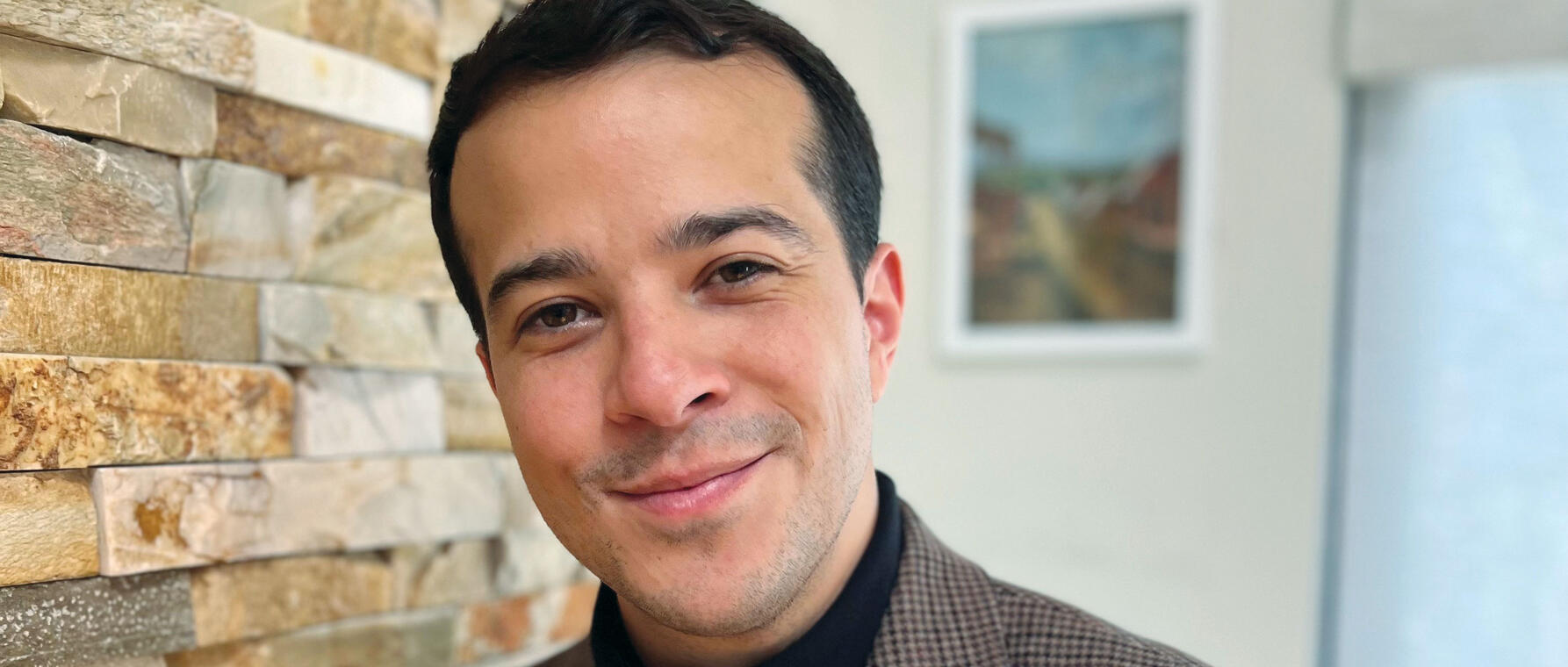
Share this page
Mateo Jarquín, PhD ’19, describes his new book, The Sandinista Revolution , as “a history of the Nicaraguan revolution truly told on Nicaraguan terms.” Based on his PhD dissertation and 2019 Harvard Horizons project, the book explores the years between 1979 and 1990 not only from the perspective of his Nicaraguan compatriots but also in the context of the country’s outsized influence on global politics. A better understanding of the Nicaraguan revolution, he asserts, yields new insights about the Cold War and the mark it left on Latin America.
You come from Nicaragua. Your family was involved in the revolution—sometimes on different sides. What influence did that history have on this book?
After the fall of the Somoza dictatorship in 1979, the Nicaraguan society was divided. Sandinista leaders embarked on a crusade to remake the country and sweep away all vestiges of the old regime. You were either for the revolution or against it.
My family didn’t fit neatly into those boxes. Both of my parents were members of the Sandinista government. Both had siblings in the US-backed opposition. After the revolution, we experienced a sort of tense reconciliation, as did many Nicaraguan families. It exemplified what happened at the national level.
My book isn’t about this personal history, but my research was shaped by it in countless ways. I started this work with the intuition and conviction that an account of this time in Nicaragua had to allow for complexity and messiness. It had to be skeptical of the broad categories and concepts scholars use to make sense of revolutions in general.
What does it mean to tell the story of the Sandinista revolution on Nicaraguan terms, as you try to do in the book?
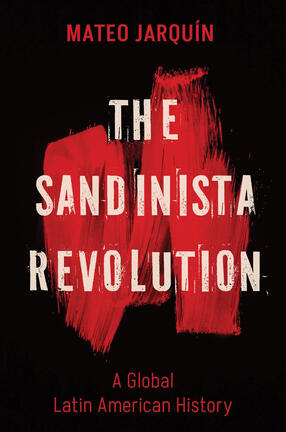
President Ronald Reagan’s decision to fund anti-Sandinista insurgents known as the Contras in the 1980s ignited intense political debates, culminating in the Iran-Contra scandal. Consequently, most scholarship at the time reflected that US-based discourse. Even today, some of the richest and most widely read accounts of the revolution tend to be written from an American perspective and center on the motivations, consequences, and justification of US military intervention in Central America.
Of course, the way that Nicaraguans remember the revolution couldn’t be more different. For better or worse, they don’t think of Ronald Reagan and Oliver North as major protagonists or antagonists; they are fundamentally focused on the struggles between Nicaraguans. While my book places the history of the revolution in an international context, the main characters are the leaders of the Sandinista government because it’s important to tell this story in a way that gives agency to the people who lived it, who had the greatest impact, and who had the most at stake.
Nicaragua is a small country. It’s not an economic, military, or geopolitical power. Why is it important to better understand the revolution there?
It was the last major revolution of the 20th century—a rapid, violent change of government that preceded a radical effort to remake the socioeconomic structure, institutions, and even values of a society. In that sense, it was an important milestone in the transition from the Cold War era, when the Global South was alive with revolutionary movements, to the present day. That’s the global significance.
In Latin America, the Sandinista revolution was the first time—and last, it turned out—that the armed left managed to seize power after the Cuban revolution. The effect it had on regional politics was not unlike that of the Mexican and Cuban revolutions. Armed leftist organizations in other countries, especially in Central America, looked at what the Sandinistas did and said, “We can do that, too. That’s a blueprint for our success.” The slogan became, “Si Nicaragua venció, El Salvador vencerá”—if Nicaragua vanquished, El Salvador shall vanquish as well. This sentiment also affected Guatemala.
The Sandinista victory inspired many peer organizations across the region but also caused a huge backlash. Right-wing forces across Central America looked at what happened in Nicaragua and asked, “What do we need to do to avoid suffering the same fate as Somoza?” The ideological and geopolitical dimensions of the Cold War intensified these regional dynamics. The result was the most violent episode of Latin America’s history during the Cold War, in which around 300,000 people died.
Finally, you say that the Sandinista revolution began as an effort to democratize Nicaragua socially and economically. Today, you describe Nicaragua as an authoritarian state ruled by the family of Daniel Ortega, the former Sandinista leader. So, what’s the legacy of the revolution?
In the book, I resist the temptation to draw a direct line between the 1980s and today. Mr. Ortega and his wife claim to be carrying on the legacy of the revolution. Those from hardline anti-Sandinista backgrounds tend to agree, except they cast it in a very negative light. They argue that everything wrong with Nicaragua today is a direct consequence of 1979 and the policies of the 1980s. Still other Nicaraguans including many who supported the revolution, see Ortega as a usurper who betrayed the values of the original Sandinista project. They don’t see continuity but rather a break with the past, and they think comparisons with the earlier Somoza regime are more instructive coming from a society that was born of revolution and counter-revolution, where people have Manichaean outlooks driven by absolutes, I think what we need now is a little more room for unanswered questions and open-ended discussion.
Get the Latest Updates
Join our newsletter, subscribe to colloquy podcast, connect with us, view the entire issue, view all issues online, related news.

Paying It Forward
The members of the 2024 Centennial Medalist cohort—like those of the past 35 years—have defined excellence in their chosen fields.
Centering Dissenters
As a groundbreaking historian and activist, 2024 Centennial Medalist Martin Duberman has helped bring members of the LGBTQ+ community back into the American picture.

The Gold Standard for Scholarship
For more than four decades as a curator at the National Gallery of Art in Washington, DC, and teacher at the University of Maryland, 2024 Centennial Medalist Arthur Wheelock brought knowledge and love of art to new generations of learners.

Colloquy Podcast: Testing and the Origin of Big Data
Today, we are all the subjects of constant algorithmic testing by big tech companies—whether we like it or not. How did we get here?
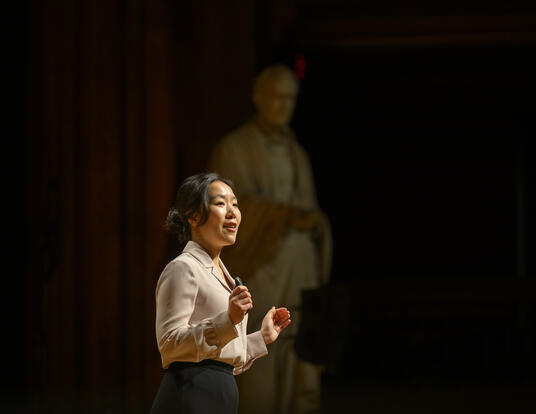
Alumni Relations
The Office of Alumni Relations encourages connections between alumni and the University, partnering with alumni leaders, students, and administrators to develop opportunities for engagement.

IMAGES
VIDEO
COMMENTS
Review these sample graduate school essays to stimulate your authentic creativity and to see what a winning grad school application essay looks like.
The grad school personal statement is an important part of your application. Here are a few good graduate admission essay examples to inspire you.
Learn how to craft graduate essay with our analysis of successful graduate essay examples. Improve your writing skills and increase your chances of admission.
Read our graduate school personal statement examples and in depth analysis of a sample personal statement for graduate school for tips on your own essay.
A great graduate school application essay can help a student stand out from other applicants. Learn more about writing a compelling grad school essay.
1 The Goal of the Writing Sample A writing sample for graduate school primarily serves an evidential function: its purpose is to give evidence of your qualifications to enter graduate school at the program you're applying to. Of course the central way it does so is by being a good piece of philosophical writing, and we'll spend a bunch of time on that below. But in every philosophical ...
Learn top tips and tricks for writing your grad school admissions essay.
Getting Started Every graduate school requires applicants to submit either a personal statement or a statement of purpose (sometimes called a research statement). This handout details some of the main differences between the two types of documents, and provides tips on how to create an essay which clearly demonstrates your personal strengths, goals, and commitment to the field and highlights ...
You have limited space in a personal statement, so use it wisely! Do think bigger than yourself: try to express how your individual aspirations relate to your local community, your academic field, or society more broadly. It's not just about what you'll get out of graduate school, but about what you'll be able to give back.
In this article, you will find a detailed explanation of how to write a standout graduate admissions essay.
4 SAMPLE GRADUATE SCHOOL ESSAYS. #1. "From Working Poor to Elite Scholar". One of the proudest accomplishments of my life was earning my college degree, despite the fact that my early adulthood pointed in the opposite direction, beginning with my marriage at the age of 19. Throughout the 1990s I lived as one of the "working poor," someone who ...
Showcase your writing skills, if required, with a sample aligned with the expectations of your field.
A writing sample, much like a transcript or recommendation letter, is a way to gauge your potential to succeed in a graduate program. Admissions committees will look to your writing sample to learn about how you engage with new ideas, participate in current conversations in your field, structure your research, and articulate a theory or argument.
How do you choose a strong writing sample for graduate school? Learn the importance of this application component — and how to stand out.
Learn essential tips and techniques for writing an impressive essay for graduate school applications and increase your chances of getting accepted into your desired program.
Regardless of the type of school you are applying to, you will be required to submit an admissions essay as part of the application process. Graduate programs want students with clear commitment to the field. Essay prompts typically ask applicants to discuss their previous experience, future professional goals, and how the program can help them ...
This guide explains how to write a statement of purpose for graduate school, then offers 7 examples of successful statements of purpose, with in-depth analysis from experts.
The Writing Sample for Graduate School - Magoosh Blog — GRE® Test. Magoosh is the leader in GRE prep having helped millions of students study since 2010. Our affordable self-study plan includes exclusive official practice questions, full-length practice tests, and a score improvement guarantee. Top Resources: Free GRE Practice Test 1,000 ...
Types of Application Essays for Graduate School When applying to graduate school, you will likely be asked to write one or more essays. These essays are a chance for you to demonstrate to the admissions committee your strengths as an applicant and your interest in the program. However, there are many different types of application essays you may be asked to write. Some universities may require ...
Statement of Purpose The statement of purpose is very important to programs when deciding whether to admit a candidate. Your statement should be focused, informative, and convey your research interests and qualifications. You should describe your reasons and motivations for pursuing a graduate degree in your chosen degree program, noting the experiences that shaped your research ambitions ...
Looking for graduate school statement of purpose examples? Our guide includes a range of examples plus analysis of a successful statement of purpose sample.
A statement of purpose (SOP) is a critical component of most graduate school applications, and are often required for various types of graduate level programs, including Graduate Certificates and Master's Degrees.
To get into graduate school, you need a strong statement of purpose that builds a picture of your experience, achievements, and motivations.
Book traversal links for Applying for Graduate School: Application Essay or Personal Statement guide ‹ Applying for Graduate School: Academic Resume/CV examples Up; Planning for Graduate School Applications ›
The Harvard Kenneth C. Griffin Graduate School of Arts and Sciences is a leading institution of graduate study, offering PhD and select master's degrees as well as opportunities to study without pursuing a degree as a visiting student.
Mateo Jarquín, PhD '19, describes his new book, The Sandinista Revolution, as "a history of the Nicaraguan revolution truly told on Nicaraguan terms."Based on his PhD dissertation and 2019 Harvard Horizons project, the book explores the years between 1979 and 1990 not only from the perspective of his Nicaraguan compatriots but also in the context of the country's outsized influence on ...